Database abstraction object. More...
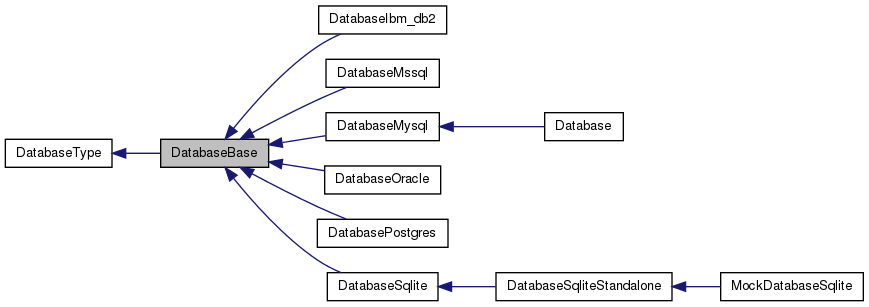
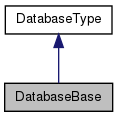
Public Member Functions | |
| __construct ($server=false, $user=false, $password=false, $dbName=false, $flags=0, $tablePrefix= 'get from global') | |
| Constructor. | |
| __sleep () | |
| Called by serialize. | |
| addIdentifierQuotes ($s) | |
| Quotes an identifier using `backticks` or "double quotes" depending on the database type. | |
| addQuotes ($s) | |
| If it's a string, adds quotes and backslashes Otherwise returns as-is. | |
| aggregateValue ($valuedata, $valuename= 'value') | |
| Return aggregated value alias. | |
| anyChar () | |
| Returns a token for buildLike() that denotes a '_' to be used in a LIKE query. | |
| anyString () | |
| Returns a token for buildLike() that denotes a '' to be used in a LIKE query. | |
| begin ($fname= 'DatabaseBase::begin') | |
| Begin a transaction, committing any previously open transaction. | |
| bitAnd ($fieldLeft, $fieldRight) | |
| bitNot ($field) | |
| Bitwise operations. | |
| bitOr ($fieldLeft, $fieldRight) | |
| bufferResults ($buffer=null) | |
| Turns buffering of SQL result sets on (true) or off (false). | |
| buildConcat ($stringList) | |
| Build a concatenation list to feed into a SQL query. | |
| buildLike () | |
| LIKE statement wrapper, receives a variable-length argument list with parts of pattern to match containing either string literals that will be escaped or tokens returned by anyChar() or anyString(). | |
| cascadingDeletes () | |
| Returns true if this database supports (and uses) cascading deletes. | |
| cleanupTriggers () | |
| Returns true if this database supports (and uses) triggers (e.g. | |
| clearFlag ($flag) | |
| Clear a flag for this connection. | |
| close () | |
| Closes a database connection. | |
| commit ($fname= 'DatabaseBase::commit') | |
| End a transaction. | |
| conditional ($cond, $trueVal, $falseVal) | |
| Returns an SQL expression for a simple conditional. | |
| deadlockLoop () | |
| Perform a deadlock-prone transaction. | |
| debug ($debug=null) | |
| Boolean, controls output of large amounts of debug information. | |
| decodeBlob ($b) | |
| Some DBMSs return a special placeholder object representing blob fields in result objects. | |
| delete ($table, $conds, $fname= 'DatabaseBase::delete') | |
| DELETE query wrapper. | |
| deleteJoin ($delTable, $joinTable, $delVar, $joinVar, $conds, $fname= 'DatabaseBase::deleteJoin') | |
| DELETE where the condition is a join. | |
| doneWrites () | |
| Returns true if the connection may have been used for write queries. | |
| dropTable ($tableName, $fName= 'DatabaseBase::dropTable') | |
| Delete a table. | |
| duplicateTableStructure ($oldName, $newName, $temporary=false, $fname= 'DatabaseBase::duplicateTableStructure') | |
| Creates a new table with structure copied from existing table Note that unlike most database abstraction functions, this function does not automatically append database prefix, because it works at a lower abstraction level. | |
| encodeBlob ($b) | |
| Some DBMSs have a special format for inserting into blob fields, they don't allow simple quoted strings to be inserted. | |
| encodeExpiry ($expiry) | |
| Encode an expiry time. | |
| errorCount ($count=null) | |
| Get/set the number of errors logged. | |
| escapeLike ($s) | |
| Escape string for safe LIKE usage. | |
| estimateRowCount ($table, $vars= '*', $conds= '', $fname= 'DatabaseBase::estimateRowCount', $options=array()) | |
| Estimate rows in dataset. | |
| execute ($prepared, $args=null) | |
| Execute a prepared query with the various arguments. | |
| fieldExists ($table, $field, $fname= 'DatabaseBase::fieldExists') | |
| Determines whether a field exists in a table. | |
| fieldType ($res, $index) | |
| mysql_field_type() wrapper | |
| fillPrepared ($preparedQuery, $args) | |
| For faking prepared SQL statements on DBs that don't support it directly. | |
| fillPreparedArg ($matches) | |
| preg_callback func for fillPrepared() The arguments should be in $this->preparedArgs and must not be touched while we're doing this. | |
| freePrepared ($prepared) | |
| Free a prepared query, generated by prepare(). | |
| freeResult ($res) | |
| Free a result object returned by query() or select(). | |
| functionalIndexes () | |
| Returns true if this database can use functional indexes. | |
| getDBname () | |
| Get the current DB name. | |
| getFlag ($flag) | |
| Returns a boolean whether the flag $flag is set for this connection. | |
| getInfinity () | |
| Find out when 'infinity' is. | |
| getLag () | |
| Get slave lag. | |
| getLBInfo ($name=null) | |
| Get properties passed down from the server info array of the load balancer. | |
| getMasterPos () | |
| Get the position of this master. | |
| getProperty ($name) | |
| General read-only accessor. | |
| getSchemaPath () | |
| Return a path to the DBMS-specific schema file, otherwise default to tables.sql. | |
| getSearchEngine () | |
| Get search engine class. | |
| getServer () | |
| Get the server hostname or IP address. | |
| getServerInfo () | |
| A string describing the current software version, and possibly other details in a user-friendly way. | |
| getServerUptime () | |
| Determines how long the server has been up STUB. | |
| getSlavePos () | |
| Get the replication position of this slave. | |
| getWikiID () | |
| ignoreErrors ($ignoreErrors=null) | |
| Turns on (false) or off (true) the automatic generation and sending of a "we're sorry, but there has been a database error" page on database errors. | |
| implicitGroupby () | |
| Returns true if this database does an implicit sort when doing GROUP BY. | |
| implicitOrderby () | |
| Returns true if this database does an implicit order by when the column has an index For example: SELECT page_title FROM page LIMIT 1. | |
| indexExists ($table, $index, $fname= 'DatabaseBase::indexExists') | |
| Determines whether an index exists Usually throws a DBQueryError on failure If errors are explicitly ignored, returns NULL on failure. | |
| indexName ($index) | |
| Get the name of an index in a given table. | |
| indexUnique ($table, $index) | |
| Determines if a given index is unique. | |
| insert ($table, $a, $fname= 'DatabaseBase::insert', $options=array()) | |
| INSERT wrapper, inserts an array into a table. | |
| insertSelect ($destTable, $srcTable, $varMap, $conds, $fname= 'DatabaseBase::insertSelect', $insertOptions=array(), $selectOptions=array()) | |
| INSERT SELECT wrapper. | |
| isOpen () | |
| Is a connection to the database open? | |
| isQuotedIdentifier ($name) | |
| Returns if the given identifier looks quoted or not according to the database convention for quoting identifiers . | |
| isWriteQuery ($sql) | |
| Determine whether a query writes to the DB. | |
| lastQuery () | |
| Return the last query that went through DatabaseBase::query() | |
| limitResult ($sql, $limit, $offset=false) | |
| Construct a LIMIT query with optional offset. | |
| limitResultForUpdate ($sql, $num) | |
| listTables ($prefix=null, $fname= 'DatabaseBase::listTables') | |
| List all tables on the database. | |
| lock ($lockName, $method, $timeout=5) | |
| Acquire a named lock. | |
| lockTables ($read, $write, $method, $lowPriority=true) | |
| Lock specific tables. | |
| lowPriorityOption () | |
| A string to insert into queries to show that they're low-priority, like MySQL's LOW_PRIORITY. | |
| makeInsertOptions ($options) | |
| Helper for DatabaseBase::insert(). | |
| makeList ($a, $mode=LIST_COMMA) | |
| Makes an encoded list of strings from an array. | |
| makeSelectOptions ($options) | |
| Returns an optional USE INDEX clause to go after the table, and a string to go at the end of the query. | |
| makeUpdateOptions ($options) | |
| Make UPDATE options for the DatabaseBase::update function. | |
| makeWhereFrom2d ($data, $baseKey, $subKey) | |
| Build a partial where clause from a 2-d array such as used for LinkBatch. | |
| masterPosWait (DBMasterPos $pos, $timeout) | |
| Wait for the slave to catch up to a given master position. | |
| maxListLen () | |
| Return the maximum number of items allowed in a list, or 0 for unlimited. | |
| nextSequenceValue ($seqName) | |
| Returns an appropriately quoted sequence value for inserting a new row. | |
| patchPath ($patch) | |
| Get the full path of a patch file. | |
| ping () | |
| Ping the server and try to reconnect if it there is no connection. | |
| prepare ($sql, $func= 'DatabaseBase::prepare') | |
| Intended to be compatible with the PEAR::DB wrapper functions. | |
| query ($sql, $fname= '', $tempIgnore=false) | |
| Run an SQL query and return the result. | |
| quote_ident ($s) | |
| Backwards compatibility, identifier quoting originated in DatabasePostgres which used quote_ident which does not follow our naming conventions was renamed to addIdentifierQuotes. | |
| realTimestamps () | |
| Returns true if this database uses timestamps rather than integers. | |
| replace ($table, $uniqueIndexes, $rows, $fname= 'DatabaseBase::replace') | |
| REPLACE query wrapper. | |
| reportConnectionError ($error= 'Unknown error') | |
| reportQueryError ($error, $errno, $sql, $fname, $tempIgnore=false) | |
| Report a query error. | |
| resultObject ($result) | |
| Take the result from a query, and wrap it in a ResultWrapper if necessary. | |
| rollback ($fname= 'DatabaseBase::rollback') | |
| Rollback a transaction. | |
| safeQuery ($query, $args=null) | |
| Prepare & execute an SQL statement, quoting and inserting arguments in the appropriate places. | |
| searchableIPs () | |
| Returns true if this database can do a native search on IP columns e.g. | |
| select ($table, $vars, $conds= '', $fname= 'DatabaseBase::select', $options=array(), $join_conds=array()) | |
| Execute a SELECT query constructed using the various parameters provided. | |
| selectDB ($db) | |
| Change the current database. | |
| selectField ($table, $var, $cond= '', $fname= 'DatabaseBase::selectField', $options=array()) | |
| A SELECT wrapper which returns a single field from a single result row. | |
| selectRow ($table, $vars, $conds, $fname= 'DatabaseBase::selectRow', $options=array(), $join_conds=array()) | |
| Single row SELECT wrapper. | |
| selectSQLText ($table, $vars, $conds= '', $fname= 'DatabaseBase::select', $options=array(), $join_conds=array()) | |
| The equivalent of DatabaseBase::select() except that the constructed SQL is returned, instead of being immediately executed. | |
| set ($table, $var, $value, $cond, $fname= 'DatabaseBase::set') | |
| Simple UPDATE wrapper. | |
| setBigSelects ($value=true) | |
| Allow or deny "big selects" for this session only. | |
| setFakeMaster ($enabled=true) | |
| Make this connection a fake master. | |
| setFakeSlaveLag ($lag) | |
| Set lag time in seconds for a fake slave. | |
| setFlag ($flag) | |
| Set a flag for this connection. | |
| setLBInfo ($name, $value=null) | |
| Set the LB info array, or a member of it. | |
| setSchemaVars ($vars) | |
| Set variables to be used in sourceFile/sourceStream, in preference to the ones in $GLOBALS. | |
| setSessionOptions (array $options) | |
| Override database's default behavior. | |
| setTimeout ($timeout) | |
| Override database's default connection timeout. | |
| sourceFile ($filename, $lineCallback=false, $resultCallback=false, $fname=false) | |
| Read and execute SQL commands from a file. | |
| sourceStream ($fp, $lineCallback=false, $resultCallback=false, $fname= 'DatabaseBase::sourceStream', $inputCallback=false) | |
| Read and execute commands from an open file handle. | |
| standardSelectDistinct () | |
| Returns true if this database requires that SELECT DISTINCT queries require that all ORDER BY expressions occur in the SELECT list per the SQL92 standard. | |
| streamStatementEnd (&$sql, &$newLine) | |
| Called by sourceStream() to check if we've reached a statement end. | |
| strictIPs () | |
| Returns true if this database is strict about what can be put into an IP field. | |
| strreplace ($orig, $old, $new) | |
| Returns a comand for str_replace function in SQL query. | |
| tableExists ($table, $fname=__METHOD__) | |
| Query whether a given table exists. | |
| tableName ($name, $format= 'quoted') | |
| Format a table name ready for use in constructing an SQL query. | |
| tableNames () | |
| Fetch a number of table names into an array This is handy when you need to construct SQL for joins. | |
| tableNamesN () | |
| Fetch a number of table names into an zero-indexed numerical array This is handy when you need to construct SQL for joins. | |
| tableNamesWithAlias ($tables) | |
| Gets an array of aliased table names. | |
| tableNameWithAlias ($name, $alias=false) | |
| Get an aliased table name e.g. | |
| tablePrefix ($prefix=null) | |
| Get/set the table prefix. | |
| textFieldSize ($table, $field) | |
| Returns the size of a text field, or -1 for "unlimited". | |
| timestamp ($ts=0) | |
| Convert a timestamp in one of the formats accepted by wfTimestamp() to the format used for inserting into timestamp fields in this DBMS. | |
| timestampOrNull ($ts=null) | |
| Convert a timestamp in one of the formats accepted by wfTimestamp() to the format used for inserting into timestamp fields in this DBMS. | |
| trxLevel ($level=null) | |
| Gets or sets the current transaction level. | |
| unionQueries ($sqls, $all) | |
| Construct a UNION query This is used for providing overload point for other DB abstractions not compatible with the MySQL syntax. | |
| unionSupportsOrderAndLimit () | |
| Returns true if current database backend supports ORDER BY or LIMIT for separate subqueries within the UNION construct. | |
| unlock ($lockName, $method) | |
| Release a lock. | |
| unlockTables ($method) | |
| Unlock specific tables. | |
| update ($table, $values, $conds, $fname= 'DatabaseBase::update', $options=array()) | |
| UPDATE wrapper. | |
| useIndexClause ($index) | |
| USE INDEX clause. | |
| wasDeadlock () | |
| Determines if the last failure was due to a deadlock STUB. | |
| wasErrorReissuable () | |
| Determines if the last query error was something that should be dealt with by pinging the connection and reissuing the query. | |
| wasLockTimeout () | |
| Determines if the last failure was due to a lock timeout STUB. | |
| wasReadOnlyError () | |
| Determines if the last failure was due to the database being read-only. | |
Static Public Member Functions | |
| static | factory ($dbType, $p=array()) |
| Given a DB type, construct the name of the appropriate child class of DatabaseBase. | |
| static | generalizeSQL ($sql) |
| Removes most variables from an SQL query and replaces them with X or N for numbers. | |
| static | newFromParams ($server, $user, $password, $dbName, $flags=0) |
| Same as new DatabaseMysql( ... | |
| static | newFromType ($dbType, $p=array()) |
| Same as new factory( ... | |
Public Attributes | |
| $mDBname | |
| $mFakeMaster = false | |
| $mPassword | |
| $mUser | |
Protected Member Functions | |
| connectionErrorHandler ($errno, $errstr) | |
| doQuery ($sql) | |
| The DBMS-dependent part of query() | |
| escapeLikeInternal ($s) | |
| getDefaultSchemaVars () | |
| Get schema variables to use if none have been set via setSchemaVars(). | |
| getSchemaVars () | |
| Get schema variables. | |
| indexNameCallback ($matches) | |
| Index name callback. | |
| installErrorHandler () | |
| nativeReplace ($table, $rows, $fname) | |
| REPLACE query wrapper for MySQL and SQLite, which have a native REPLACE statement. | |
| replaceSchemaVars ($ins) | |
| Database independent variable replacement. | |
| replaceVars ($ins) | |
| Replace variables in sourced SQL. | |
| restoreErrorHandler () | |
| tableNameCallback ($matches) | |
| Table name callback. | |
| tableNamesWithUseIndexOrJOIN ($tables, $use_index=array(), $join_conds=array()) | |
| Get the aliased table name clause for a FROM clause which might have a JOIN and/or USE INDEX clause. | |
Protected Attributes | |
| $delimiter = ';' | |
| $htmlErrors | |
| $mConn = null | |
| $mDefaultBigSelects = null | |
| $mDoneWrites = false | |
| $mErrorCount = 0 | |
| $mFakeSlaveLag = null | |
| $mFlags | |
| $mLastQuery = '' | |
| $mLBInfo = array() | |
| $mOpened = false | |
| $mPHPError = false | |
| $mSchemaVars = false | |
| $mServer | |
| $mTablePrefix | |
| $mTrxLevel = 0 | |
| $preparedArgs | |
Detailed Description
Database abstraction object.
Definition at line 200 of file Database.php.
Constructor & Destructor Documentation
| DatabaseBase::__construct | ( | $ | server = false, |
| $ | user = false, |
||
| $ | password = false, |
||
| $ | dbName = false, |
||
| $ | flags = 0, |
||
| $ | tablePrefix = 'get from global' |
||
| ) |
Constructor.
- Parameters:
-
$server String: database server host $user String: database user name $password String: database user password $dbName String: database name $flags $tablePrefix String: database table prefixes. By default use the prefix gave in LocalSettings.php
Reimplemented in DatabaseIbm_db2, and DatabaseOracle.
Definition at line 588 of file Database.php.
References $user, $wgCommandLineMode, $wgDBprefix, and DatabaseType\open().

Member Function Documentation
Called by serialize.
Throw an exception when DB connection is serialized. This causes problems on some database engines because the connection is not restored on unserialize.
Definition at line 620 of file Database.php.
Quotes an identifier using `backticks` or "double quotes" depending on the database type.
MySQL uses `backticks` while basically everything else uses double quotes. Since MySQL is the odd one out here the double quotes are our generic and we implement backticks in DatabaseMysql.
- Parameters:
-
$s string
- Returns:
- string
Reimplemented in DatabaseOracle, DatabaseMssql, and DatabaseMysql.
Definition at line 2182 of file Database.php.
Referenced by DatabasePostgres\duplicateTableStructure(), DatabaseSqlite\duplicateTableStructure(), DatabasePostgres\open(), quote_ident(), and replaceSchemaVars().

| DatabaseBase::addQuotes | ( | $ | s | ) |
If it's a string, adds quotes and backslashes Otherwise returns as-is.
- Parameters:
-
$s string
- Returns:
- string
Reimplemented in DatabaseOracle, DatabasePostgres, DatabaseMssql, DatabaseIbm_db2, and DatabaseSqlite.
Definition at line 2160 of file Database.php.
References DatabaseType\strencode().
Referenced by fillPreparedArg(), DatabaseMysql\lock(), makeList(), DatabaseMysql\masterPosWait(), DatabaseMysql\open(), replace(), replaceSchemaVars(), and DatabaseMysql\unlock().


| DatabaseBase::aggregateValue | ( | $ | valuedata, |
| $ | valuename = 'value' |
||
| ) |
Return aggregated value alias.
- Parameters:
-
$valuedata $valuename string
- Returns:
- string
Reimplemented in DatabaseOracle, and DatabasePostgres.
Definition at line 2995 of file Database.php.
Returns a token for buildLike() that denotes a '_' to be used in a LIKE query.
- Returns:
- LikeMatch
Definition at line 2277 of file Database.php.
Returns a token for buildLike() that denotes a '' to be used in a LIKE query.
- Returns:
- LikeMatch
Definition at line 2286 of file Database.php.
| DatabaseBase::begin | ( | $ | fname = 'DatabaseBase::begin' | ) |
Begin a transaction, committing any previously open transaction.
- Parameters:
-
$fname string
Reimplemented in DatabaseOracle, DatabaseIbm_db2, DatabaseMssql, and DatabaseSqlite.
Definition at line 2862 of file Database.php.
References $fname, and query().
Referenced by deadlockLoop(), DatabasePostgres\insert(), DatabasePostgres\insertSelect(), and query().

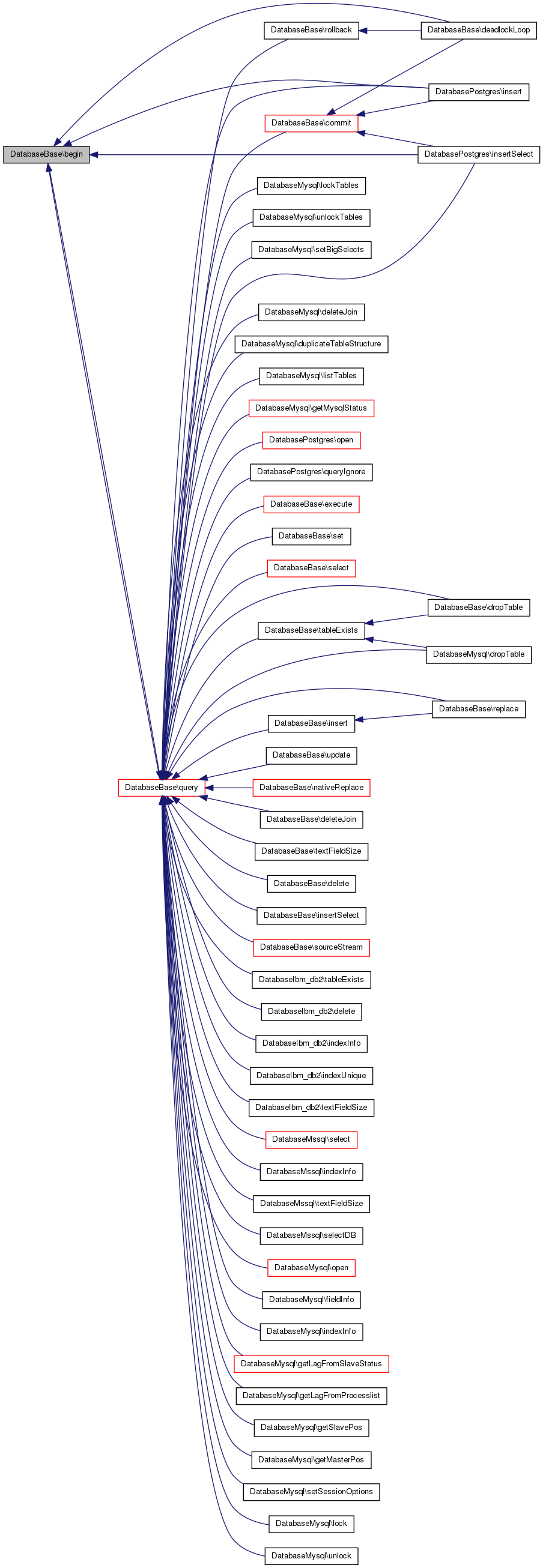
| DatabaseBase::bitAnd | ( | $ | fieldLeft, |
| $ | fieldRight | ||
| ) |
- Parameters:
-
$fieldLeft $fieldRight
- Returns:
- string
Reimplemented in DatabaseIbm_db2, and DatabaseOracle.
Definition at line 1863 of file Database.php.
| DatabaseBase::bitNot | ( | $ | field | ) |
Bitwise operations.
- Parameters:
-
$field
- Returns:
- string
Reimplemented in DatabaseIbm_db2, and DatabaseOracle.
Definition at line 1854 of file Database.php.
| DatabaseBase::bitOr | ( | $ | fieldLeft, |
| $ | fieldRight | ||
| ) |
- Parameters:
-
$fieldLeft $fieldRight
- Returns:
- string
Reimplemented in DatabaseIbm_db2, and DatabaseOracle.
Definition at line 1872 of file Database.php.
| DatabaseBase::bufferResults | ( | $ | buffer = null | ) |
Turns buffering of SQL result sets on (true) or off (false).
Default is "on".
Unbuffered queries are very troublesome in MySQL:
- If another query is executed while the first query is being read out, the first query is killed. This means you can't call normal MediaWiki functions while you are reading an unbuffered query result from a normal wfGetDB() connection.
- Unbuffered queries cause the MySQL server to use large amounts of memory and to hold broad locks which block other queries.
If you want to limit client-side memory, it's almost always better to split up queries into batches using a LIMIT clause than to switch off buffering.
- Parameters:
-
$buffer null|bool
- Returns:
- The previous value of the flag
Definition at line 284 of file Database.php.
References wfSetBit().
Referenced by DatabaseMysql\doQuery().


| DatabaseBase::buildConcat | ( | $ | stringList | ) |
Build a concatenation list to feed into a SQL query.
- Parameters:
-
$stringList Array: list of raw SQL expressions; caller is responsible for any quoting
- Returns:
- String
Reimplemented in DatabaseIbm_db2, DatabasePostgres, DatabaseMssql, and DatabaseSqlite.
Definition at line 3333 of file Database.php.
LIKE statement wrapper, receives a variable-length argument list with parts of pattern to match containing either string literals that will be escaped or tokens returned by anyChar() or anyString().
Alternatively, the function could be provided with an array of aforementioned parameters.
Example: $dbr->buildLike( 'My_page_title/', $dbr->anyString() ) returns a LIKE clause that searches for subpages of 'My page title'. Alternatively: $pattern = array( 'My_page_title/', $dbr->anyString() ); $query .= $dbr->buildLike( $pattern );
- Since:
- 1.16
- Returns:
- String: fully built LIKE statement
Reimplemented in DatabaseSqlite.
Definition at line 2252 of file Database.php.
References escapeLikeInternal().

Returns true if this database supports (and uses) cascading deletes.
- Returns:
- bool
Reimplemented in DatabaseIbm_db2, DatabaseOracle, DatabasePostgres, and DatabaseMssql.
Definition at line 398 of file Database.php.
Referenced by dropTable().

Returns true if this database supports (and uses) triggers (e.g.
on the page table)
- Returns:
- bool
Reimplemented in DatabaseIbm_db2, DatabaseOracle, DatabasePostgres, and DatabaseMssql.
Definition at line 407 of file Database.php.
| DatabaseBase::clearFlag | ( | $ | flag | ) |
Clear a flag for this connection.
- Parameters:
-
$flag,: same as setFlag()'s $flag param
Definition at line 525 of file Database.php.
Closes a database connection.
if it is open : commits any open transactions
- Returns:
- Bool operation success. true if already closed.
Reimplemented in DatabaseIbm_db2, DatabaseOracle, DatabasePostgres, DatabaseMysql, DatabaseSqlite, and DatabaseMssql.
Definition at line 731 of file Database.php.
| DatabaseBase::commit | ( | $ | fname = 'DatabaseBase::commit' | ) |
End a transaction.
- Parameters:
-
$fname string
Reimplemented in DatabaseOracle, DatabaseIbm_db2, DatabaseMssql, and DatabaseSqlite.
Definition at line 2872 of file Database.php.
References $fname, and query().
Referenced by DatabaseMysql\close(), deadlockLoop(), DatabasePostgres\insert(), DatabasePostgres\insertSelect(), and DatabaseMysql\masterPosWait().
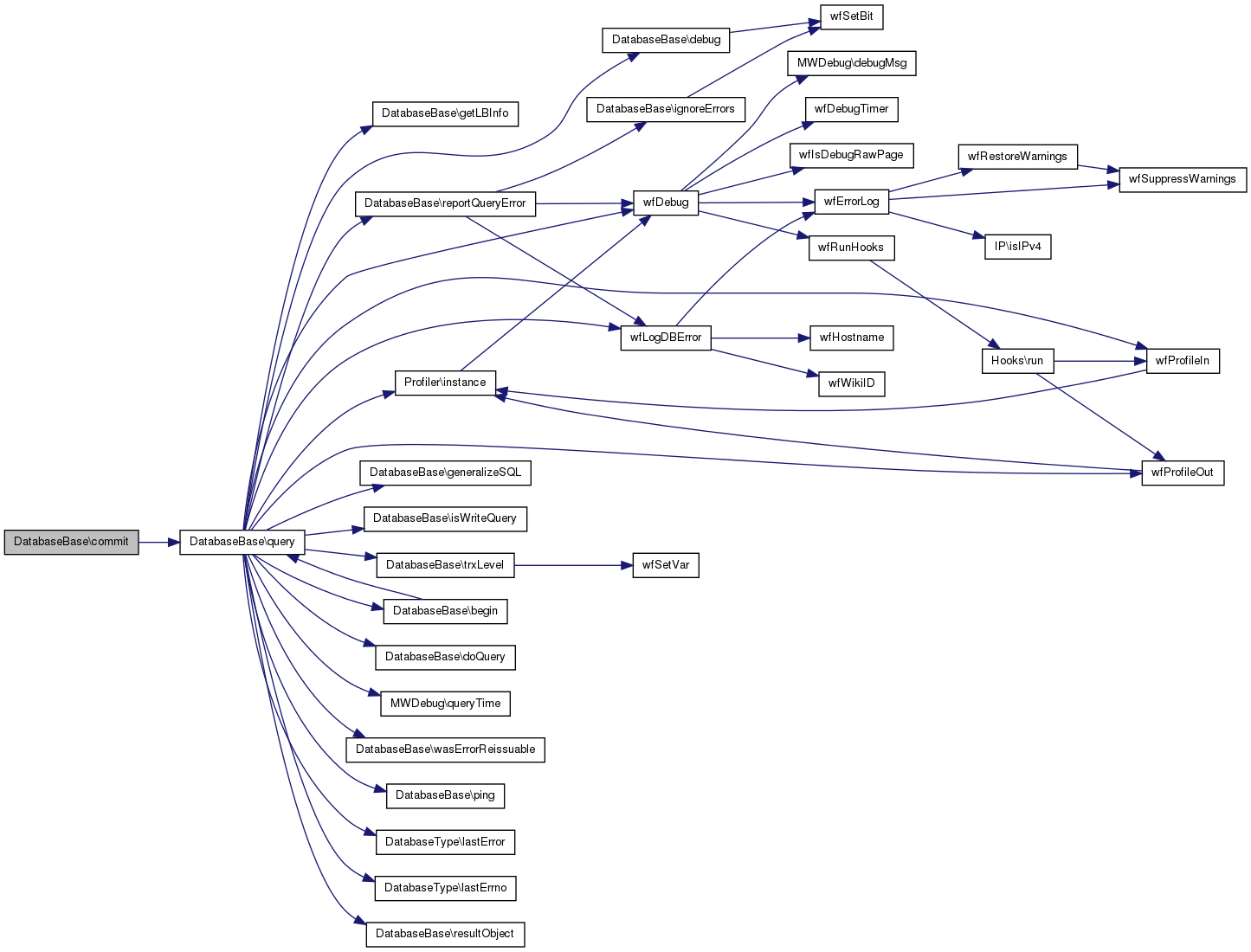

| DatabaseBase::conditional | ( | $ | cond, |
| $ | trueVal, | ||
| $ | falseVal | ||
| ) |
Returns an SQL expression for a simple conditional.
This doesn't need to be overridden unless CASE isn't supported in your DBMS.
- Parameters:
-
$cond String: SQL expression which will result in a boolean value $trueVal String: SQL expression to return if true $falseVal String: SQL expression to return if false
- Returns:
- String: SQL fragment
Definition at line 2660 of file Database.php.
| DatabaseBase::connectionErrorHandler | ( | $ | errno, |
| $ | errstr | ||
| ) | [protected] |
- Parameters:
-
$errno $errstr
Definition at line 721 of file Database.php.
Perform a deadlock-prone transaction.
This function invokes a callback function to perform a set of write queries. If a deadlock occurs during the processing, the transaction will be rolled back and the callback function will be called again.
Usage: $dbw->deadlockLoop( callback, ... );
Extra arguments are passed through to the specified callback function.
Returns whatever the callback function returned on its successful, iteration, or false on error, for example if the retry limit was reached.
- Returns:
- bool
Reimplemented in DatabaseSqlite.
Definition at line 2747 of file Database.php.
References $fname, begin(), commit(), ignoreErrors(), DatabaseType\lastErrno(), DatabaseType\lastError(), lastQuery(), reportQueryError(), rollback(), and wasDeadlock().
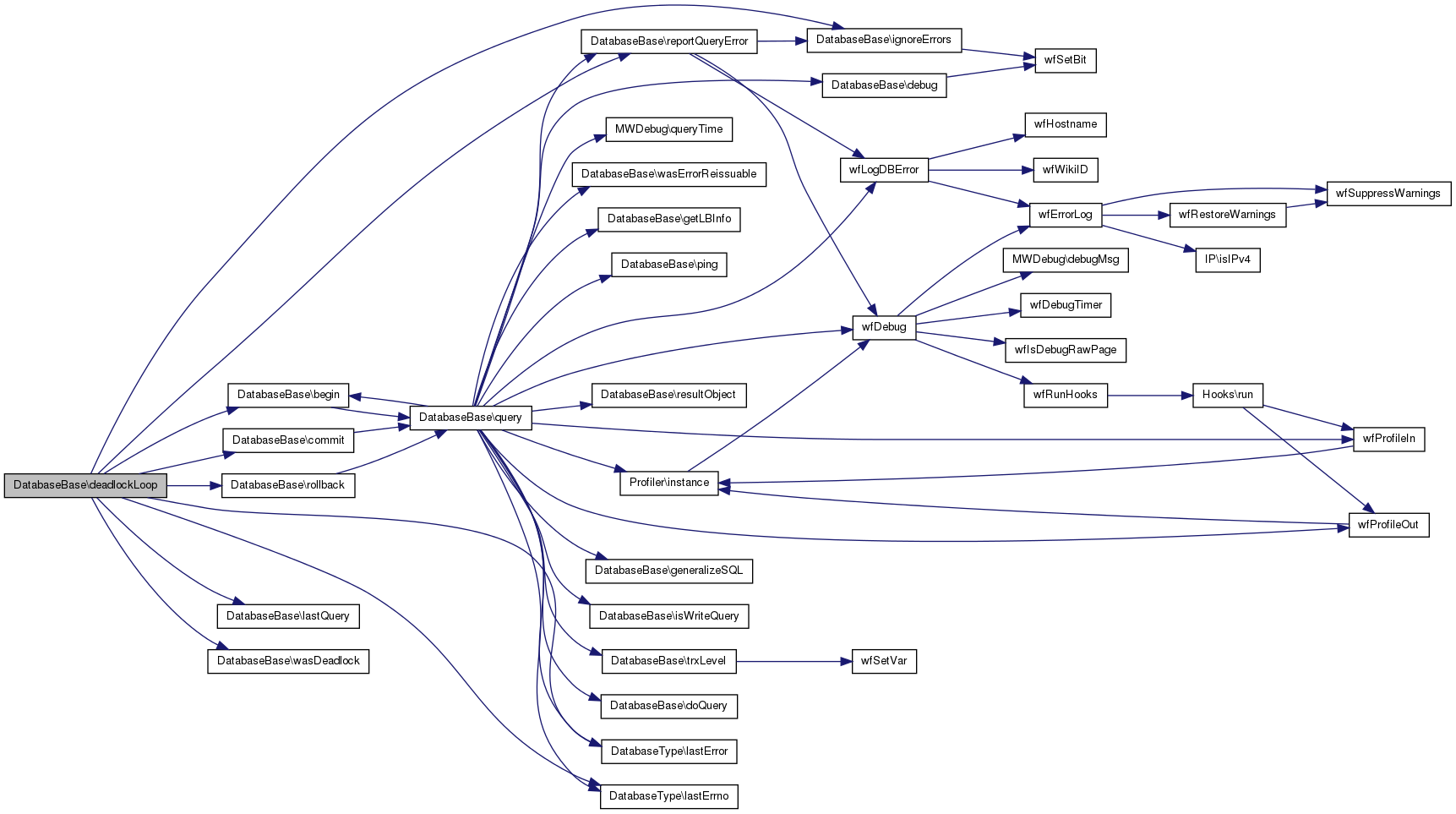
| DatabaseBase::debug | ( | $ | debug = null | ) |
Boolean, controls output of large amounts of debug information.
- Parameters:
-
$debug bool|null - true to enable debugging
- false to disable debugging
- omitted or null to do nothing
- Returns:
- The previous value of the flag
Definition at line 258 of file Database.php.
References wfSetBit().
Referenced by query().

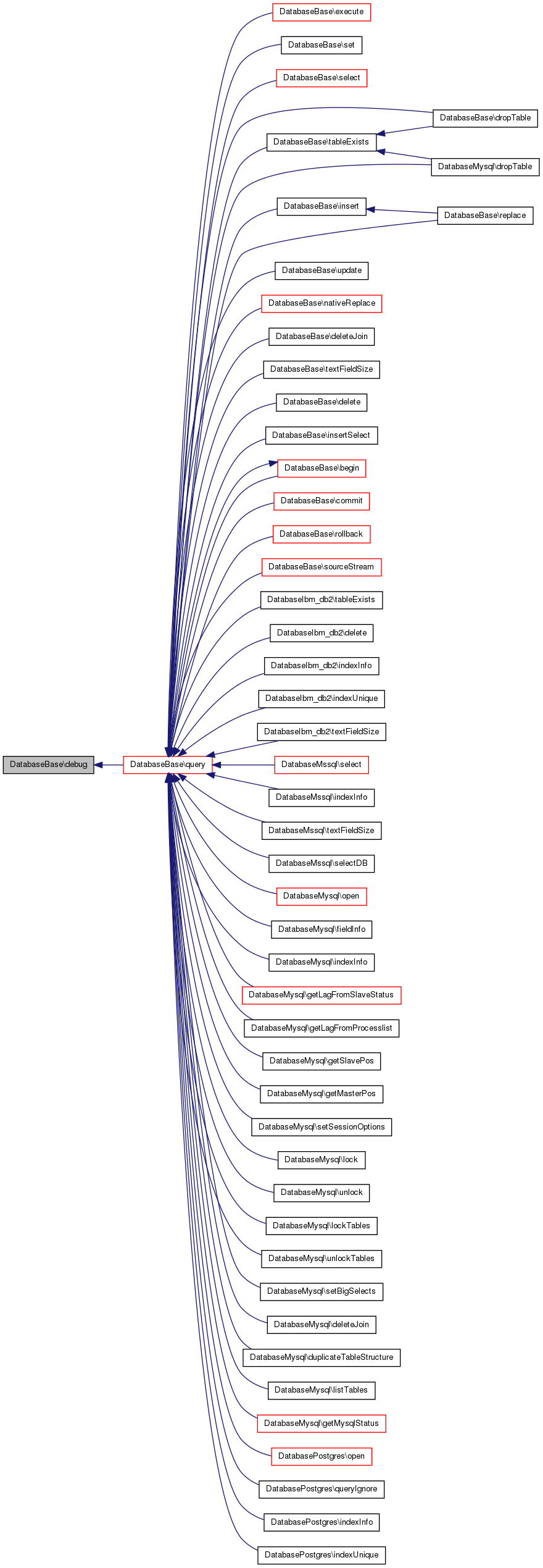
| DatabaseBase::decodeBlob | ( | $ | b | ) |
Some DBMSs return a special placeholder object representing blob fields in result objects.
Pass the object through this function to return the original string.
- Parameters:
-
$b string
- Returns:
- string
Reimplemented in DatabaseIbm_db2, DatabasePostgres, DatabaseMssql, DatabaseOracle, and DatabaseSqlite.
Definition at line 3050 of file Database.php.
| DatabaseBase::delete | ( | $ | table, |
| $ | conds, | ||
| $ | fname = 'DatabaseBase::delete' |
||
| ) |
DELETE query wrapper.
- Parameters:
-
$table Array Table name $conds String|Array of conditions. See $conds in DatabaseBase::select() for the format. Use $conds == "*" to delete all rows $fname String name of the calling function
- Returns:
- bool
Reimplemented in DatabaseOracle, and DatabaseIbm_db2.
Definition at line 2508 of file Database.php.
References $fname, makeList(), query(), and tableName().

| DatabaseBase::deleteJoin | ( | $ | delTable, |
| $ | joinTable, | ||
| $ | delVar, | ||
| $ | joinVar, | ||
| $ | conds, | ||
| $ | fname = 'DatabaseBase::deleteJoin' |
||
| ) |
DELETE where the condition is a join.
MySQL overrides this to use a multi-table DELETE syntax, in other databases we use sub-selects
For safety, an empty $conds will not delete everything. If you want to delete all rows where the join condition matches, set $conds='*'.
DO NOT put the join condition in $conds.
- Parameters:
-
$delTable String: The table to delete from. $joinTable String: The other table. $delVar String: The variable to join on, in the first table. $joinVar String: The variable to join on, in the second table. $conds Array: Condition array of field names mapped to variables, ANDed together in the WHERE clause $fname String: Calling function name (use __METHOD__) for logs/profiling
Reimplemented in DatabaseMysql.
Definition at line 2442 of file Database.php.
References $fname, makeList(), query(), and tableName().

Returns true if the connection may have been used for write queries.
Should return true if unsure.
- Returns:
- bool
Definition at line 492 of file Database.php.
| DatabaseBase::doQuery | ( | $ | sql | ) | [abstract, protected] |
The DBMS-dependent part of query()
- Parameters:
-
$sql String: SQL query.
- Returns:
- ResultWrapper Result object to feed to fetchObject, fetchRow, ...; or false on failure
Reimplemented in DatabaseIbm_db2, DatabaseOracle, DatabasePostgres, DatabaseSqlite, DatabaseMssql, and DatabaseMysql.
Referenced by query().

| DatabaseBase::dropTable | ( | $ | tableName, |
| $ | fName = 'DatabaseBase::dropTable' |
||
| ) |
Delete a table.
- Parameters:
-
$tableName string $fName string
- Returns:
- bool|ResultWrapper
- Since:
- 1.18
Reimplemented in DatabaseMysql, and DatabaseOracle.
Definition at line 3398 of file Database.php.
References cascadingDeletes(), query(), tableExists(), and tableName().

| DatabaseBase::duplicateTableStructure | ( | $ | oldName, |
| $ | newName, | ||
| $ | temporary = false, |
||
| $ | fname = 'DatabaseBase::duplicateTableStructure' |
||
| ) |
Creates a new table with structure copied from existing table Note that unlike most database abstraction functions, this function does not automatically append database prefix, because it works at a lower abstraction level.
The table names passed to this function shall not be quoted (this function calls addIdentifierQuotes when needed).
- Parameters:
-
$oldName String: name of table whose structure should be copied $newName String: name of table to be created $temporary Boolean: whether the new table should be temporary $fname String: calling function name
- Returns:
- Boolean: true if operation was successful
Reimplemented in DatabaseMysql, DatabaseSqlite, DatabaseOracle, and DatabasePostgres.
Definition at line 2906 of file Database.php.
| DatabaseBase::encodeBlob | ( | $ | b | ) |
Some DBMSs have a special format for inserting into blob fields, they don't allow simple quoted strings to be inserted.
To insert into such a field, pass the data through this function before passing it to DatabaseBase::insert().
- Parameters:
-
$b string
- Returns:
- string
Reimplemented in DatabaseIbm_db2, DatabasePostgres, DatabaseMssql, DatabaseOracle, and DatabaseSqlite.
Definition at line 3039 of file Database.php.
| DatabaseBase::encodeExpiry | ( | $ | expiry | ) |
Encode an expiry time.
- Parameters:
-
$expiry String: timestamp for expiry, or the 'infinity' string
- Returns:
- String
Definition at line 3436 of file Database.php.
References getInfinity(), and timestamp().

| DatabaseBase::errorCount | ( | $ | count = null | ) |
Get/set the number of errors logged.
Only useful when errors are ignored
- Parameters:
-
$count The count to set, or omitted to leave it unchanged.
- Returns:
- The error count
Definition at line 325 of file Database.php.
References $count, and wfSetVar().

| DatabaseBase::escapeLike | ( | $ | s | ) |
Escape string for safe LIKE usage.
WARNING: you should almost never use this function directly, instead use buildLike() that escapes everything automatically
- Deprecated:
- since 1.17, warnings in 1.17, removed in ???
- Parameters:
-
$s string
- Returns:
- string
Definition at line 2223 of file Database.php.
References escapeLikeInternal(), and wfDeprecated().

| DatabaseBase::escapeLikeInternal | ( | $ | s | ) | [protected] |
- Parameters:
-
$s string
- Returns:
- string
Definition at line 2232 of file Database.php.
References DatabaseType\strencode().
Referenced by buildLike(), and escapeLike().


| DatabaseBase::estimateRowCount | ( | $ | table, |
| $ | vars = '*', |
||
| $ | conds = '', |
||
| $ | fname = 'DatabaseBase::estimateRowCount', |
||
| $ | options = array() |
||
| ) |
Estimate rows in dataset.
MySQL allows you to estimate the number of rows that would be returned by a SELECT query, using EXPLAIN SELECT. The estimate is provided using index cardinality statistics, and is notoriously inaccurate, especially when large numbers of rows have recently been added or deleted.
For DBMSs that don't support fast result size estimation, this function will actually perform the SELECT COUNT(*).
Takes the same arguments as DatabaseBase::select().
- Parameters:
-
$table String: table name Array | string $vars : unused Array | string $conds : filters on the table $fname String: function name for profiling $options Array: options for select
- Returns:
- Integer: row count
Reimplemented in DatabasePostgres, DatabaseMysql, and DatabaseMssql.
Definition at line 1480 of file Database.php.
References $fname, $options, $res, $rows, DatabaseType\fetchRow(), and select().

| DatabaseBase::execute | ( | $ | prepared, |
| $ | args = null |
||
| ) |
Execute a prepared query with the various arguments.
- Parameters:
-
$prepared String: the prepared sql $args Mixed: Either an array here, or put scalars as varargs
- Returns:
- ResultWrapper
Reimplemented in DatabaseIbm_db2.
Definition at line 962 of file Database.php.
References fillPrepared(), and query().
Referenced by safeQuery().
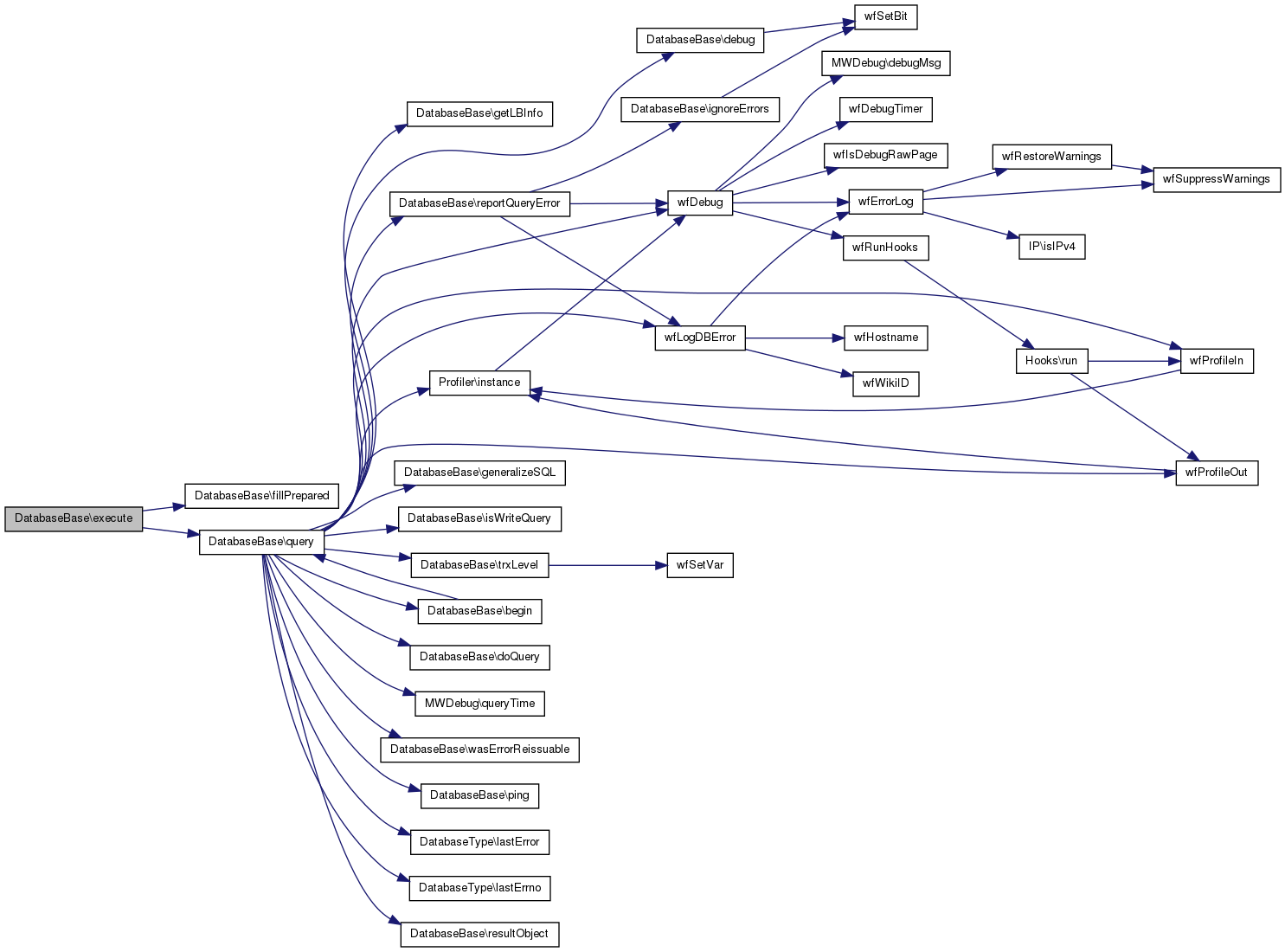

| static DatabaseBase::factory | ( | $ | dbType, |
| $ | p = array() |
||
| ) | [static, final] |
Given a DB type, construct the name of the appropriate child class of DatabaseBase.
This is designed to replace all of the manual stuff like: $class = 'Database' . ucfirst( strtolower( $type ) ); as well as validate against the canonical list of DB types we have
This factory function is mostly useful for when you need to connect to a database other than the MediaWiki default (such as for external auth, an extension, et cetera). Do not use this to connect to the MediaWiki database. Example uses in core:
- See also:
- LoadBalancer::reallyOpenConnection()
- ExternalUser_MediaWiki::initFromCond()
- ForeignDBRepo::getMasterDB()
- WebInstaller_DBConnect::execute()
- Parameters:
-
$dbType String A possible DB type $p Array An array of options to pass to the constructor. Valid options are: host, user, password, dbname, flags, tablePrefix
- Returns:
- DatabaseBase subclass or null
Definition at line 673 of file Database.php.
Referenced by WebInstaller_DBConnect\execute(), DBLockManager\getConnection(), ExternalUser_vB\getDb(), ForeignDBRepo\getMasterDB(), ExternalUser_MediaWiki\initFromCond(), newFromType(), and LoadBalancer\reallyOpenConnection().

| DatabaseBase::fieldExists | ( | $ | table, |
| $ | field, | ||
| $ | fname = 'DatabaseBase::fieldExists' |
||
| ) |
Determines whether a field exists in a table.
- Parameters:
-
$table String: table name $field String: filed to check on that table $fname String: calling function name (optional)
- Returns:
- Boolean: whether $table has filed $field
Reimplemented in DatabaseMssql.
Definition at line 1530 of file Database.php.
References DatabaseType\fieldInfo().

| DatabaseBase::fieldType | ( | $ | res, |
| $ | index | ||
| ) |
mysql_field_type() wrapper
- Parameters:
-
$res $index
- Returns:
- string
Reimplemented in DatabaseIbm_db2, and DatabasePostgres.
Definition at line 1579 of file Database.php.
References $res.
| DatabaseBase::fillPrepared | ( | $ | preparedQuery, |
| $ | args | ||
| ) |
For faking prepared SQL statements on DBs that don't support it directly.
- Parameters:
-
$preparedQuery String: a 'preparable' SQL statement $args Array of arguments to fill it with
- Returns:
- string executable SQL
Reimplemented in DatabaseIbm_db2.
Definition at line 1009 of file Database.php.
Referenced by execute().

| DatabaseBase::fillPreparedArg | ( | $ | matches | ) |
preg_callback func for fillPrepared() The arguments should be in $this->preparedArgs and must not be touched while we're doing this.
- Parameters:
-
$matches Array
- Returns:
- String
Reimplemented in DatabaseIbm_db2.
Definition at line 1025 of file Database.php.
References $matches, and addQuotes().

| DatabaseBase::freePrepared | ( | $ | prepared | ) |
Free a prepared query, generated by prepare().
- Parameters:
-
$prepared
Reimplemented in DatabaseIbm_db2.
Definition at line 951 of file Database.php.
Referenced by safeQuery().

| DatabaseBase::freeResult | ( | $ | res | ) |
Free a result object returned by query() or select().
It's usually not necessary to call this, just use unset() or let the variable holding the result object go out of scope.
- Parameters:
-
$res Mixed: A SQL result
Reimplemented in DatabaseIbm_db2, DatabaseOracle, DatabasePostgres, DatabaseSqlite, DatabaseMysql, and DatabaseMssql.
Definition at line 1052 of file Database.php.
Returns true if this database can use functional indexes.
- Returns:
- bool
Reimplemented in DatabaseIbm_db2, DatabasePostgres, and DatabaseMssql.
Definition at line 474 of file Database.php.
| static DatabaseBase::generalizeSQL | ( | $ | sql | ) | [static] |
Removes most variables from an SQL query and replaces them with X or N for numbers.
It's only slightly flawed. Don't use for anything important.
- Parameters:
-
$sql String A SQL Query
- Returns:
- string
Definition at line 1502 of file Database.php.
Referenced by query().

Get the current DB name.
Reimplemented in DatabaseOracle, and DatabasePostgres.
Definition at line 1896 of file Database.php.
| DatabaseBase::getDefaultSchemaVars | ( | ) | [protected] |
Get schema variables to use if none have been set via setSchemaVars().
Override this in derived classes to provide variables for tables.sql and SQL patch files.
- Returns:
- array
Reimplemented in DatabaseMysql.
Definition at line 3302 of file Database.php.
Referenced by getSchemaVars().

| DatabaseBase::getFlag | ( | $ | flag | ) |
Returns a boolean whether the flag $flag is set for this connection.
- Parameters:
-
$flag,: same as setFlag()'s $flag param
- Returns:
- Boolean
Definition at line 535 of file Database.php.
Referenced by DatabaseOracle\doQuery().

Find out when 'infinity' is.
Most DBMSes support this. This is a special keyword for timestamps in PostgreSQL, and works with CHAR(14) as well because "i" sorts after all numbers.
- Returns:
- String
Reimplemented in DatabaseOracle, and DatabaseMssql.
Definition at line 3426 of file Database.php.
Referenced by encodeExpiry().

Get slave lag.
Currently supported only by MySQL.
Note that this function will generate a fatal error on many installations. Most callers should use LoadBalancer::safeGetLag() instead.
- Returns:
- Database replication lag in seconds
Reimplemented in DatabaseMysql.
Definition at line 3018 of file Database.php.
| DatabaseBase::getLBInfo | ( | $ | name = null | ) |
Get properties passed down from the server info array of the load balancer.
- Parameters:
-
$name string The entry of the info array to get, or null to get the whole array
- Returns:
- LoadBalancer|null
Definition at line 347 of file Database.php.
Referenced by query().

Get the position of this master.
- Returns:
- DBMasterPos, or false if this is not a master
Reimplemented in DatabaseMysql.
Definition at line 2849 of file Database.php.
| DatabaseBase::getProperty | ( | $ | name | ) |
General read-only accessor.
- Parameters:
-
$name string
- Returns:
- string
Definition at line 546 of file Database.php.
Return a path to the DBMS-specific schema file, otherwise default to tables.sql.
- Returns:
- string
Definition at line 566 of file Database.php.
References $IP, and DatabaseType\getType().

| DatabaseBase::getSchemaVars | ( | ) | [protected] |
Get schema variables.
If none have been set via setSchemaVars(), then use some defaults from the current object.
- Returns:
- array
Definition at line 3286 of file Database.php.
References getDefaultSchemaVars().
Referenced by replaceSchemaVars().


Get search engine class.
All subclasses of this need to implement this if they wish to use searching.
- Returns:
- String
Reimplemented in DatabaseIbm_db2, DatabaseOracle, DatabasePostgres, DatabaseMssql, DatabaseMysql, and DatabaseSqlite.
Definition at line 3415 of file Database.php.
Get the server hostname or IP address.
Reimplemented in DatabaseOracle, and DatabasePostgres.
Definition at line 1903 of file Database.php.
A string describing the current software version, and possibly other details in a user-friendly way.
Will be listed on Special:Version, etc. Use getServerVersion() to get machine-friendly information.
- Returns:
- string: Version information from the database server
Implements DatabaseType.
Reimplemented in DatabaseSqlite.
Definition at line 245 of file Database.php.
References DatabaseType\getServerVersion().

Determines how long the server has been up STUB.
- Returns:
- int
Reimplemented in DatabaseMysql.
Definition at line 2684 of file Database.php.
Get the replication position of this slave.
- Returns:
- DBMasterPos, or false if this is not a slave.
Reimplemented in DatabaseMysql.
Definition at line 2833 of file Database.php.
References wfDebug().

| DatabaseBase::ignoreErrors | ( | $ | ignoreErrors = null | ) |
Turns on (false) or off (true) the automatic generation and sending of a "we're sorry, but there has been a database error" page on database errors.
Default is on (false). When turned off, the code should use lastErrno() and lastError() to handle the situation as appropriate.
- Parameters:
-
$ignoreErrors bool|null
- Returns:
- bool The previous value of the flag.
Definition at line 303 of file Database.php.
References wfSetBit().
Referenced by deadlockLoop(), reportQueryError(), and tableExists().


Returns true if this database does an implicit sort when doing GROUP BY.
- Returns:
- bool
Reimplemented in DatabaseIbm_db2, DatabaseOracle, DatabasePostgres, DatabaseSqlite, and DatabaseMssql.
Definition at line 435 of file Database.php.
Returns true if this database does an implicit order by when the column has an index For example: SELECT page_title FROM page LIMIT 1.
- Returns:
- bool
Reimplemented in DatabaseIbm_db2, DatabaseOracle, DatabasePostgres, and DatabaseMssql.
Definition at line 445 of file Database.php.
| DatabaseBase::indexExists | ( | $ | table, |
| $ | index, | ||
| $ | fname = 'DatabaseBase::indexExists' |
||
| ) |
Determines whether an index exists Usually throws a DBQueryError on failure If errors are explicitly ignored, returns NULL on failure.
- Parameters:
-
$table $index $fname string
- Returns:
- bool|null
Reimplemented in DatabaseOracle.
Definition at line 1547 of file Database.php.
References $fname, and DatabaseType\indexInfo().

| DatabaseBase::indexName | ( | $ | index | ) |
Get the name of an index in a given table.
- Parameters:
-
$index
- Returns:
- string
Reimplemented in DatabaseSqlite.
Definition at line 2137 of file Database.php.
Referenced by DatabaseMysql\indexInfo(), indexNameCallback(), DatabasePostgres\indexUnique(), and DatabaseMysql\useIndexClause().

| DatabaseBase::indexNameCallback | ( | $ | matches | ) | [protected] |
Index name callback.
- Parameters:
-
$matches array
- Returns:
- string
Definition at line 3324 of file Database.php.
References $matches, and indexName().

| DatabaseBase::indexUnique | ( | $ | table, |
| $ | index | ||
| ) |
Determines if a given index is unique.
- Parameters:
-
$table string $index string
- Returns:
- bool
Definition at line 1595 of file Database.php.
References DatabaseType\indexInfo().

| DatabaseBase::insert | ( | $ | table, |
| $ | a, | ||
| $ | fname = 'DatabaseBase::insert', |
||
| $ | options = array() |
||
| ) |
INSERT wrapper, inserts an array into a table.
$a may be either:
- A single associative array. The array keys are the field names, and the values are the values to insert. The values are treated as data and will be quoted appropriately. If NULL is inserted, this will be converted to a database NULL.
- An array with numeric keys, holding a list of associative arrays. This causes a multi-row INSERT on DBMSs that support it. The keys in each subarray must be identical to each other, and in the same order.
Usually throws a DBQueryError on failure. If errors are explicitly ignored, returns success.
$options is an array of options, with boolean options encoded as values with numeric keys, in the same style as $options in DatabaseBase::select(). Supported options are:
- IGNORE: Boolean: if present, duplicate key errors are ignored, and any rows which cause duplicate key errors are not inserted. It's possible to determine how many rows were successfully inserted using DatabaseBase::affectedRows().
- Parameters:
-
$table String Table name. This will be passed through DatabaseBase::tableName(). $a Array of rows to insert $fname String Calling function name (use __METHOD__) for logs/profiling $options Array of options
- Returns:
- bool
Reimplemented in DatabaseIbm_db2, DatabaseSqlite, DatabaseOracle, DatabasePostgres, and DatabaseMssql.
Definition at line 1648 of file Database.php.
References $fname, $keys, $options, makeInsertOptions(), makeList(), query(), and tableName().
Referenced by replace().
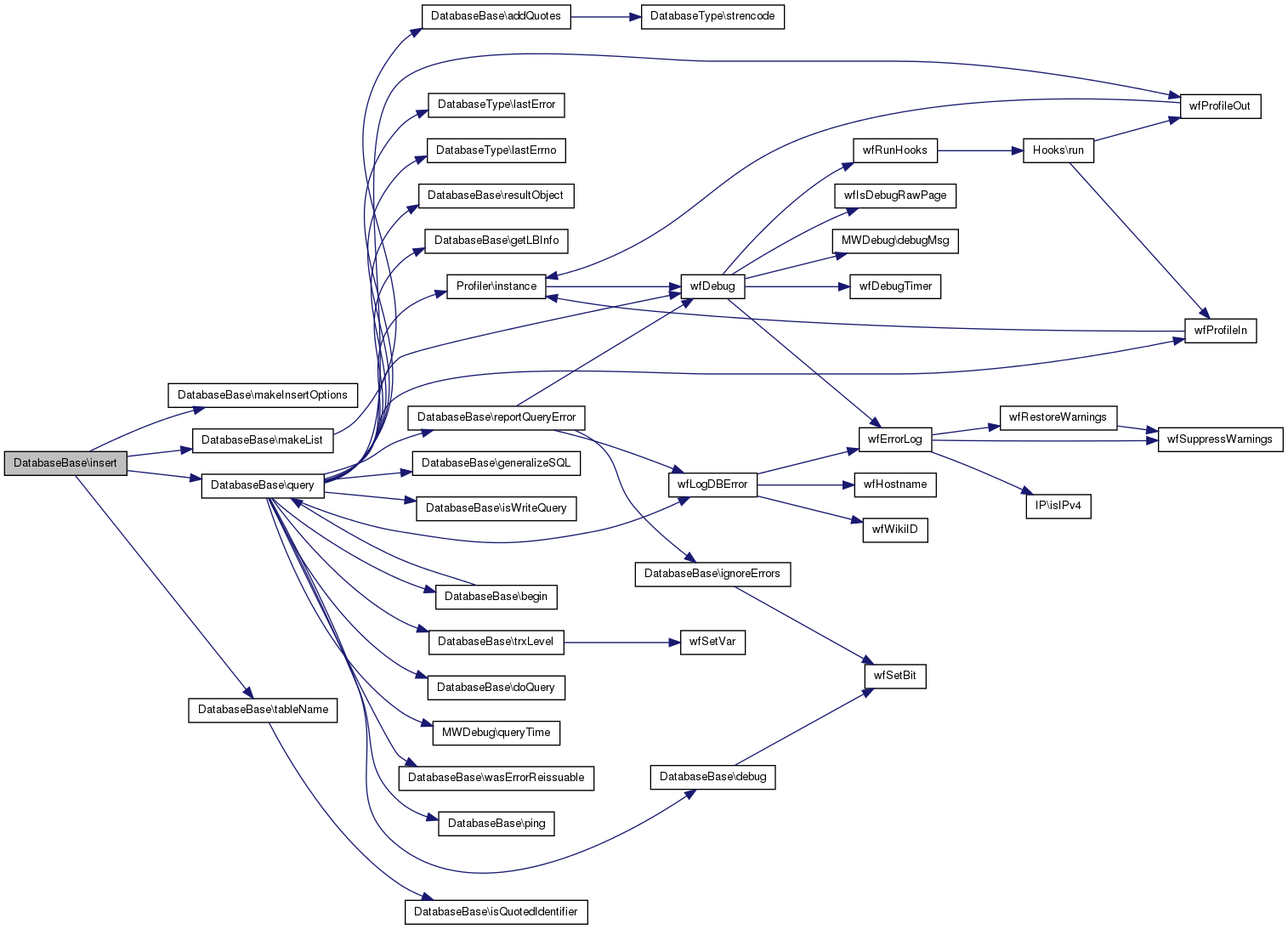

| DatabaseBase::insertSelect | ( | $ | destTable, |
| $ | srcTable, | ||
| $ | varMap, | ||
| $ | conds, | ||
| $ | fname = 'DatabaseBase::insertSelect', |
||
| $ | insertOptions = array(), |
||
| $ | selectOptions = array() |
||
| ) |
INSERT SELECT wrapper.
Takes data from a SELECT query and inserts it into another table.
- Parameters:
-
$destTable string The table name to insert into $srcTable string|array May be either a table name, or an array of table names to include in a join. $varMap array must be an associative array of the form array( 'dest1' => 'source1', ...). Source items may be literals rather than field names, but strings should be quoted with DatabaseBase::addQuotes() $conds array Condition array. See $conds in DatabaseBase::select() for the details of the format of condition arrays. May be "*" to copy the whole table. $fname string The function name of the caller, from __METHOD__ $insertOptions array Options for the INSERT part of the query, see DatabaseBase::insert() for details. $selectOptions array Options for the SELECT part of the query, see DatabaseBase::select() for details.
- Returns:
- ResultWrapper
Reimplemented in DatabaseOracle, DatabasePostgres, and DatabaseMssql.
Definition at line 2552 of file Database.php.
References $fname, makeList(), makeSelectOptions(), query(), and tableName().

| DatabaseBase::installErrorHandler | ( | ) | [protected] |
Definition at line 694 of file Database.php.
Referenced by DatabaseMysql\open(), and DatabasePostgres\open().

Is a connection to the database open?
- Returns:
- Boolean
Reimplemented in DatabaseIbm_db2.
Definition at line 500 of file Database.php.
| DatabaseBase::isQuotedIdentifier | ( | $ | name | ) |
Returns if the given identifier looks quoted or not according to the database convention for quoting identifiers .
- Parameters:
-
$name string
- Returns:
- boolean
Reimplemented in DatabaseOracle, DatabaseMssql, and DatabaseMysql.
Definition at line 2194 of file Database.php.
Referenced by tableName().

| DatabaseBase::isWriteQuery | ( | $ | sql | ) |
Determine whether a query writes to the DB.
Should return true if unsure.
- Parameters:
-
$sql string
- Returns:
- bool
Reimplemented in DatabaseSqlite.
Definition at line 765 of file Database.php.
Referenced by query().

Return the last query that went through DatabaseBase::query()
- Returns:
- String
Definition at line 482 of file Database.php.
Referenced by deadlockLoop(), and MockDatabaseSqlite\query().

| DatabaseBase::limitResult | ( | $ | sql, |
| $ | limit, | ||
| $ | offset = false |
||
| ) |
Construct a LIMIT query with optional offset.
This is used for query pages. The SQL should be adjusted so that only the first $limit rows are returned. If $offset is provided as well, then the first $offset rows should be discarded, and the next $limit rows should be returned. If the result of the query is not ordered, then the rows to be returned are theoretically arbitrary.
$sql is expected to be a SELECT, if that makes a difference. For UPDATE, limitResultForUpdate should be used.
The version provided by default works in MySQL and SQLite. It will very likely need to be overridden for most other DBMSes.
- Parameters:
-
$sql String SQL query we will append the limit too $limit Integer the SQL limit $offset Integer|false the SQL offset (default false)
- Returns:
- string
Reimplemented in DatabaseIbm_db2, DatabaseOracle, DatabasePostgres, and DatabaseMssql.
Definition at line 2610 of file Database.php.
References $limit.
Referenced by DatabaseSqlite\limitResultForUpdate(), limitResultForUpdate(), and selectSQLText().

| DatabaseBase::limitResultForUpdate | ( | $ | sql, |
| $ | num | ||
| ) |
- Parameters:
-
$sql $num
- Returns:
- string
Reimplemented in DatabaseIbm_db2, DatabaseOracle, DatabasePostgres, DatabaseSqlite, and DatabaseMssql.
Definition at line 2625 of file Database.php.
References limitResult().

| DatabaseBase::listTables | ( | $ | prefix = null, |
| $ | fname = 'DatabaseBase::listTables' |
||
| ) |
List all tables on the database.
- Parameters:
-
$prefix Only show tables with this prefix, e.g. mw_ $fname String: calling function name
Reimplemented in DatabaseMysql, DatabaseSqlite, DatabaseOracle, and DatabasePostgres.
Definition at line 2919 of file Database.php.
| DatabaseBase::lock | ( | $ | lockName, |
| $ | method, | ||
| $ | timeout = 5 |
||
| ) |
Acquire a named lock.
Abstracted from Filestore::lock() so child classes can implement for their own needs.
- Parameters:
-
$lockName String: name of lock to aquire $method String: name of method calling us $timeout Integer: timeout
- Returns:
- Boolean
Reimplemented in DatabaseMysql.
Definition at line 3348 of file Database.php.
| DatabaseBase::lockTables | ( | $ | read, |
| $ | write, | ||
| $ | method, | ||
| $ | lowPriority = true |
||
| ) |
Lock specific tables.
- Parameters:
-
$read Array of tables to lock for read access $write Array of tables to lock for write access $method String name of caller $lowPriority bool Whether to indicate writes to be LOW PRIORITY
- Returns:
- bool
Reimplemented in DatabaseMysql.
Definition at line 3376 of file Database.php.
A string to insert into queries to show that they're low-priority, like MySQL's LOW_PRIORITY.
If no such feature exists, return an empty string and nothing bad should happen.
- Returns:
- string Returns the text of the low priority option if it is supported, or a blank string otherwise
Reimplemented in DatabaseMysql.
Definition at line 2494 of file Database.php.
Referenced by makeUpdateOptions().

| DatabaseBase::makeInsertOptions | ( | $ | options | ) |
Helper for DatabaseBase::insert().
- Parameters:
-
$options array
- Returns:
- string
Reimplemented in DatabaseSqlite.
Definition at line 1611 of file Database.php.
References $options.
Referenced by insert().

| DatabaseBase::makeList | ( | $ | a, |
| $ | mode = LIST_COMMA |
||
| ) |
Makes an encoded list of strings from an array.
- Parameters:
-
$a Array containing the data $mode int Constant - LIST_COMMA: comma separated, no field names
- LIST_AND: ANDed WHERE clause (without the WHERE). See the documentation for $conds in DatabaseBase::select().
- LIST_OR: ORed WHERE clause (without the WHERE)
- LIST_SET: comma separated with field names, like a SET clause
- LIST_NAMES: comma separated field names
- Returns:
- string
Reimplemented in DatabaseIbm_db2.
Definition at line 1762 of file Database.php.
References addQuotes().
Referenced by delete(), DatabaseMysql\deleteJoin(), deleteJoin(), DatabasePostgres\insert(), insert(), DatabasePostgres\insertSelect(), insertSelect(), makeWhereFrom2d(), nativeReplace(), selectSQLText(), DatabaseMssql\tableNamesWithUseIndexOrJOIN(), and update().

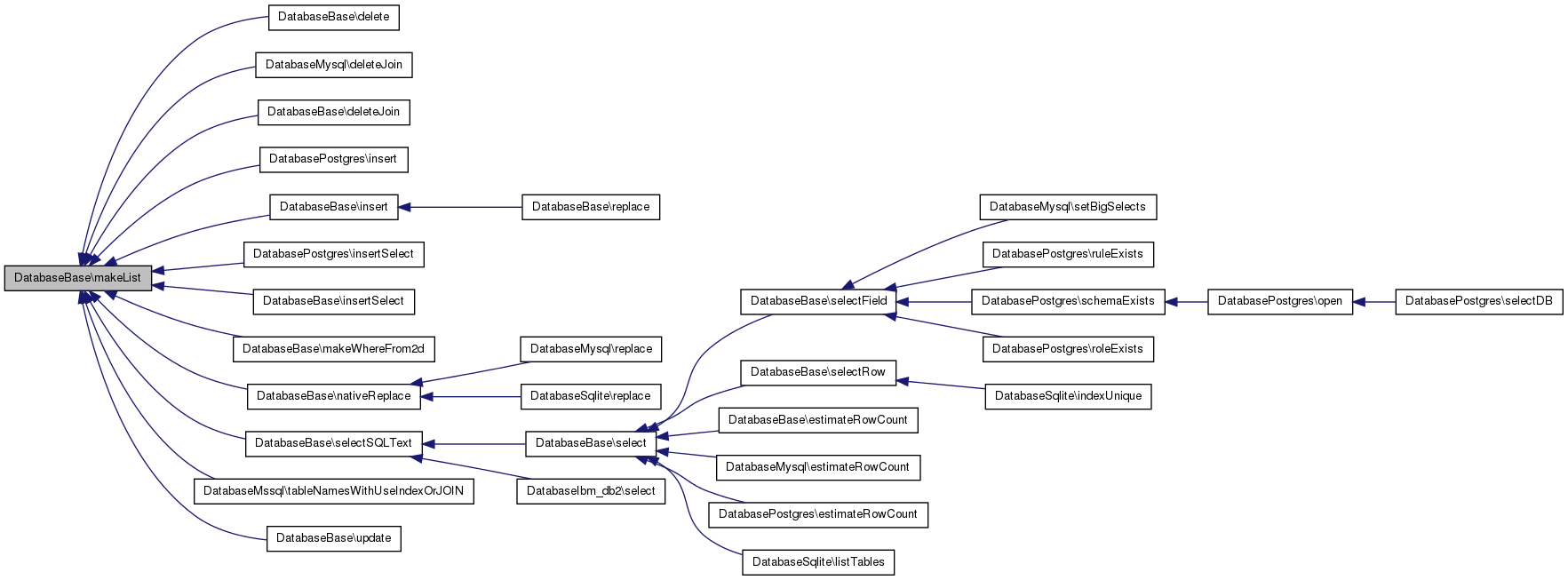
| DatabaseBase::makeSelectOptions | ( | $ | options | ) |
Returns an optional USE INDEX clause to go after the table, and a string to go at the end of the query.
- Parameters:
-
$options Array: associative array of options to be turned into an SQL query, valid keys are listed in the function.
- Returns:
- Array
- See also:
- DatabaseBase::select()
Reimplemented in DatabaseIbm_db2, DatabaseOracle, DatabasePostgres, DatabaseMssql, and DatabaseSqlite.
Definition at line 1129 of file Database.php.
References $options, and useIndexClause().
Referenced by insertSelect(), and selectSQLText().


| DatabaseBase::makeUpdateOptions | ( | $ | options | ) |
Make UPDATE options for the DatabaseBase::update function.
- Parameters:
-
$options Array: The options passed to DatabaseBase::update
- Returns:
- string
Reimplemented in DatabaseSqlite.
Definition at line 1696 of file Database.php.
References $options, and lowPriorityOption().
Referenced by DatabaseIbm_db2\update(), and update().


| DatabaseBase::makeWhereFrom2d | ( | $ | data, |
| $ | baseKey, | ||
| $ | subKey | ||
| ) |
Build a partial where clause from a 2-d array such as used for LinkBatch.
The keys on each level may be either integers or strings.
- Parameters:
-
$data Array: organized as 2-d array(baseKeyVal => array(subKeyVal => <ignored>, ...), ...) $baseKey String: field name to match the base-level keys to (eg 'pl_namespace') $subKey String: field name to match the sub-level keys to (eg 'pl_title')
- Returns:
- Mixed: string SQL fragment, or false if no items in array.
Definition at line 1827 of file Database.php.
References makeList().

| DatabaseBase::masterPosWait | ( | DBMasterPos $ | pos, |
| $ | timeout | ||
| ) |
Wait for the slave to catch up to a given master position.
- Parameters:
-
$pos DBMasterPos object $timeout Integer: the maximum number of seconds to wait for synchronisation
- Returns:
- An integer: zero if the slave was past that position already, greater than zero if we waited for some period of time, less than zero if we timed out.
Reimplemented in DatabaseMysql.
Definition at line 2800 of file Database.php.
References wfDebug(), wfProfileIn(), and wfProfileOut().

Return the maximum number of items allowed in a list, or 0 for unlimited.
- Returns:
- int
Definition at line 3027 of file Database.php.
| DatabaseBase::nativeReplace | ( | $ | table, |
| $ | rows, | ||
| $ | fname | ||
| ) | [protected] |
REPLACE query wrapper for MySQL and SQLite, which have a native REPLACE statement.
- Parameters:
-
$table string Table name $rows array Rows to insert $fname string Caller function name
- Returns:
- ResultWrapper
Definition at line 2398 of file Database.php.
References $fname, $rows, makeList(), query(), and tableName().
Referenced by DatabaseMysql\replace(), and DatabaseSqlite\replace().


| static DatabaseBase::newFromParams | ( | $ | server, |
| $ | user, | ||
| $ | password, | ||
| $ | dbName, | ||
| $ | flags = 0 |
||
| ) | [static] |
Same as new DatabaseMysql( ...
), kept for backward compatibility
- Deprecated:
- since 1.17
- Parameters:
-
$server $user $password $dbName $flags int
- Returns:
- DatabaseMysql
Definition at line 635 of file Database.php.
References $user, and wfDeprecated().

| static DatabaseBase::newFromType | ( | $ | dbType, |
| $ | p = array() |
||
| ) | [static, final] |
Same as new factory( ...
), kept for backward compatibility
- Deprecated:
- since 1.18
- See also:
- Database::factory()
Definition at line 645 of file Database.php.
References factory(), and wfDeprecated().

| DatabaseBase::nextSequenceValue | ( | $ | seqName | ) |
Returns an appropriately quoted sequence value for inserting a new row.
MySQL has autoincrement fields, so this is just NULL. But the PostgreSQL subclass will return an integer, and save the value for insertId()
Any implementation of this function should *not* involve reusing sequence numbers created for rolled-back transactions. See http://bugs.mysql.com/bug.php?id=30767 for details.
- Parameters:
-
$seqName string
- Returns:
- null
Reimplemented in DatabaseIbm_db2, DatabaseOracle, DatabasePostgres, and DatabaseMssql.
Definition at line 2301 of file Database.php.
| DatabaseBase::patchPath | ( | $ | patch | ) |
Get the full path of a patch file.
Originally based on archive() from updaters.inc. Keep in mind this always returns a patch, as it fails back to MySQL if no DB-specific patch can be found
- Parameters:
-
$patch String The name of the patch, like patch-something.sql
- Returns:
- String Full path to patch file
Definition at line 3125 of file Database.php.
References $IP, and DatabaseType\getType().

Ping the server and try to reconnect if it there is no connection.
- Returns:
- bool Success or failure
Reimplemented in DatabaseIbm_db2, and DatabaseMysql.
Definition at line 3004 of file Database.php.
Referenced by query().

| DatabaseBase::prepare | ( | $ | sql, |
| $ | func = 'DatabaseBase::prepare' |
||
| ) |
Intended to be compatible with the PEAR::DB wrapper functions.
http://pear.php.net/manual/en/package.database.db.intro-execute.php
? = scalar value, quoted as necessary ! = raw SQL bit (a function for instance) & = filename; reads the file and inserts as a blob (we don't use this though...)
This function should not be used directly by new code outside of the database classes. The query wrapper functions (select() etc.) should be used instead.
- Parameters:
-
$sql string $func string
- Returns:
- array
Reimplemented in DatabaseIbm_db2.
Definition at line 940 of file Database.php.
Referenced by safeQuery().

| DatabaseBase::query | ( | $ | sql, |
| $ | fname = '', |
||
| $ | tempIgnore = false |
||
| ) |
Run an SQL query and return the result.
Normally throws a DBQueryError on failure. If errors are ignored, returns false instead.
In new code, the query wrappers select(), insert(), update(), delete(), etc. should be used where possible, since they give much better DBMS independence and automatically quote or validate user input in a variety of contexts. This function is generally only useful for queries which are explicitly DBMS-dependent and are unsupported by the query wrappers, such as CREATE TABLE.
However, the query wrappers themselves should call this function.
- Parameters:
-
$sql String: SQL query $fname String: Name of the calling function, for profiling/SHOW PROCESSLIST comment (you can use __METHOD__ or add some extra info) $tempIgnore Boolean: Whether to avoid throwing an exception on errors... maybe best to catch the exception instead?
- Returns:
- boolean|ResultWrapper. true for a successful write query, ResultWrapper object for a successful read query, or false on failure if $tempIgnore set
- Exceptions:
-
DBQueryError Thrown when the database returns an error of any kind
Reimplemented in MockDatabaseSqlite.
Definition at line 791 of file Database.php.
References $fname, $wgRequestTime, $wgUser, begin(), debug(), doQuery(), generalizeSQL(), getLBInfo(), Profiler\instance(), isWriteQuery(), DatabaseType\lastErrno(), DatabaseType\lastError(), ping(), MWDebug\queryTime(), reportQueryError(), resultObject(), trxLevel(), wasErrorReissuable(), wfDebug(), wfLogDBError(), wfProfileIn(), and wfProfileOut().
Referenced by DatabaseSqlite\attachDatabase(), begin(), DatabaseSqlite\checkForEnabledSearch(), commit(), DatabasePostgres\constraintExists(), DatabasePostgres\currentSequenceValue(), DatabaseIbm_db2\delete(), delete(), DatabaseMysql\deleteJoin(), deleteJoin(), DatabaseMysql\dropTable(), dropTable(), DatabasePostgres\duplicateTableStructure(), DatabaseSqlite\duplicateTableStructure(), DatabaseMysql\duplicateTableStructure(), execute(), DatabaseMysql\fieldInfo(), DatabaseSqlite\fieldInfo(), DatabaseMysql\getLagFromProcesslist(), DatabaseMysql\getLagFromSlaveStatus(), DatabaseMysql\getMasterPos(), DatabaseMysql\getMysqlStatus(), DatabaseMysql\getSlavePos(), DatabaseMssql\indexInfo(), DatabaseMysql\indexInfo(), DatabasePostgres\indexInfo(), DatabaseSqlite\indexInfo(), DatabaseIbm_db2\indexInfo(), DatabasePostgres\indexUnique(), DatabaseIbm_db2\indexUnique(), MySqlLockManager\initConnection(), DatabasePostgres\insert(), insert(), DatabasePostgres\insertSelect(), insertSelect(), DatabasePostgres\listTables(), DatabaseMysql\listTables(), DatabaseMysql\lock(), DatabaseMysql\lockTables(), nativeReplace(), DatabasePostgres\nextSequenceValue(), DatabaseMysql\open(), DatabasePostgres\open(), DatabasePostgres\queryIgnore(), DatabasePostgres\relationExists(), replace(), rollback(), DatabaseMssql\select(), select(), DatabaseMssql\selectDB(), set(), DatabaseMysql\setBigSelects(), DatabaseMysql\setSessionOptions(), sourceStream(), DatabaseIbm_db2\tableExists(), tableExists(), DatabaseMssql\textFieldSize(), DatabasePostgres\textFieldSize(), DatabaseIbm_db2\textFieldSize(), textFieldSize(), DatabasePostgres\triggerExists(), DatabaseMysql\unlock(), DatabaseMysql\unlockTables(), and update().
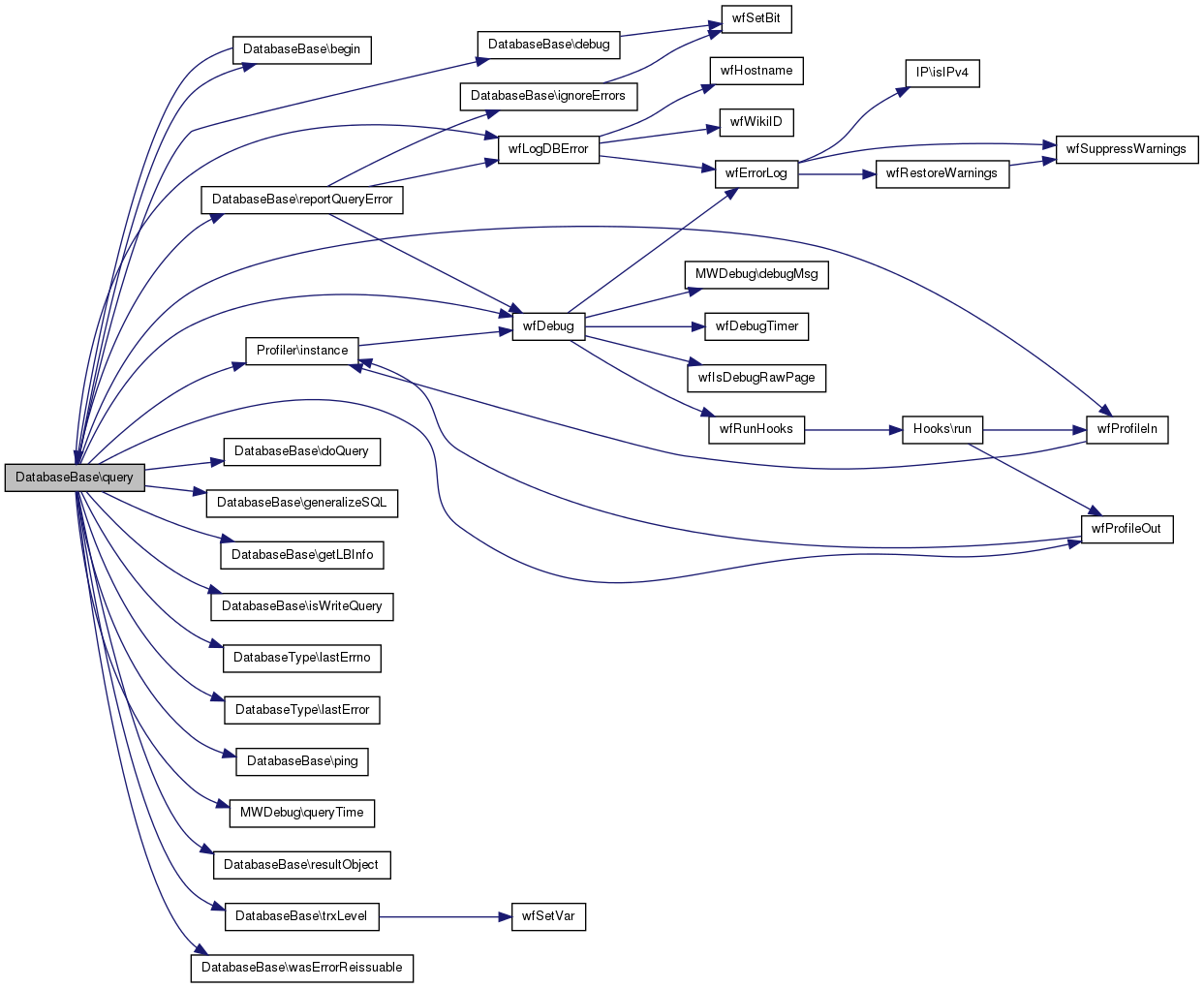
| DatabaseBase::quote_ident | ( | $ | s | ) |
Backwards compatibility, identifier quoting originated in DatabasePostgres which used quote_ident which does not follow our naming conventions was renamed to addIdentifierQuotes.
- Deprecated:
- since 1.18 use addIdentifierQuotes
- Parameters:
-
$s string
- Returns:
- string
Definition at line 2208 of file Database.php.
References addIdentifierQuotes(), and wfDeprecated().

Returns true if this database uses timestamps rather than integers.
- Returns:
- bool
Reimplemented in DatabaseIbm_db2, DatabaseOracle, DatabasePostgres, and DatabaseMssql.
Definition at line 426 of file Database.php.
| DatabaseBase::replace | ( | $ | table, |
| $ | uniqueIndexes, | ||
| $ | rows, | ||
| $ | fname = 'DatabaseBase::replace' |
||
| ) |
REPLACE query wrapper.
REPLACE is a very handy MySQL extension, which functions like an INSERT except that when there is a duplicate key error, the old row is deleted and the new row is inserted in its place.
We simulate this with standard SQL with a DELETE followed by INSERT. To perform the delete, we need to know what the unique indexes are so that we know how to find the conflicting rows.
It may be more efficient to leave off unique indexes which are unlikely to collide. However if you do this, you run the risk of encountering errors which wouldn't have occurred in MySQL.
- Parameters:
-
$table String: The table to replace the row(s) in. $rows array Can be either a single row to insert, or multiple rows, in the same format as for DatabaseBase::insert() $uniqueIndexes array is an array of indexes. Each element may be either a field name or an array of field names $fname String: Calling function name (use __METHOD__) for logs/profiling
Reimplemented in DatabaseSqlite, and DatabaseMysql.
Definition at line 2341 of file Database.php.
References $fname, $rows, addQuotes(), insert(), query(), and tableName().

| DatabaseBase::replaceSchemaVars | ( | $ | ins | ) | [protected] |
Database independent variable replacement.
Replaces a set of variables in an SQL statement with their contents as given by $this->getSchemaVars().
Supports '{$var}' `{$var}` and / *$var* / (without the spaces) style variables.
- '{$var}' should be used for text and is passed through the database's addQuotes method.
- `{$var}` should be used for identifiers (eg: table and database names), it is passed through the database's addIdentifierQuotes method which can be overridden if the database uses something other than backticks.
- / *$var* / is just encoded, besides traditional table prefix and table options its use should be avoided.
- Parameters:
-
$ins String: SQL statement to replace variables in
- Returns:
- String The new SQL statement with variables replaced
Definition at line 3246 of file Database.php.
References addIdentifierQuotes(), addQuotes(), getSchemaVars(), and DatabaseType\strencode().
Referenced by replaceVars().


| DatabaseBase::replaceVars | ( | $ | ins | ) | [protected] |
Replace variables in sourced SQL.
- Parameters:
-
$ins string
- Returns:
- string
Reimplemented in DatabasePostgres, DatabaseSqlite, and MockDatabaseSqlite.
Definition at line 3266 of file Database.php.
References replaceSchemaVars().
Referenced by sourceStream().


| DatabaseBase::reportConnectionError | ( | $ | error = 'Unknown error' | ) |
- Parameters:
-
$error String: fallback error message, used if none is given by DB
Definition at line 739 of file Database.php.
References DatabaseType\lastError().
Referenced by DatabaseMysql\open().


| DatabaseBase::reportQueryError | ( | $ | error, |
| $ | errno, | ||
| $ | sql, | ||
| $ | fname, | ||
| $ | tempIgnore = false |
||
| ) |
Report a query error.
Log the error, and if neither the object ignore flag nor the $tempIgnore flag is set, throw a DBQueryError.
- Parameters:
-
$error String $errno Integer $sql String $fname String $tempIgnore Boolean
Reimplemented in DatabaseOracle.
Definition at line 906 of file Database.php.
References $fname, $ignore, ignoreErrors(), wfDebug(), and wfLogDBError().
Referenced by deadlockLoop(), and query().


| DatabaseBase::restoreErrorHandler | ( | ) | [protected] |
- Returns:
- bool|string
Definition at line 703 of file Database.php.
Referenced by DatabaseMysql\open(), and DatabasePostgres\open().

| DatabaseBase::resultObject | ( | $ | result | ) |
Take the result from a query, and wrap it in a ResultWrapper if necessary.
Boolean values are passed through as is, to indicate success of write queries or failure.
Once upon a time, DatabaseBase::query() returned a bare MySQL result resource, and it was necessary to call this function to convert it to a wrapper. Nowadays, raw database objects are never exposed to external callers, so this is unnecessary in external code. For compatibility with old code, ResultWrapper objects are passed through unaltered.
- Parameters:
-
$result bool|ResultWrapper
- Returns:
- bool|ResultWrapper
Definition at line 2974 of file Database.php.
References $result.
Referenced by query().

| DatabaseBase::rollback | ( | $ | fname = 'DatabaseBase::rollback' | ) |
Rollback a transaction.
No-op on non-transactional databases.
- Parameters:
-
$fname string
Reimplemented in DatabaseOracle, DatabaseIbm_db2, DatabaseMssql, and DatabaseSqlite.
Definition at line 2885 of file Database.php.
References $fname, and query().
Referenced by deadlockLoop().
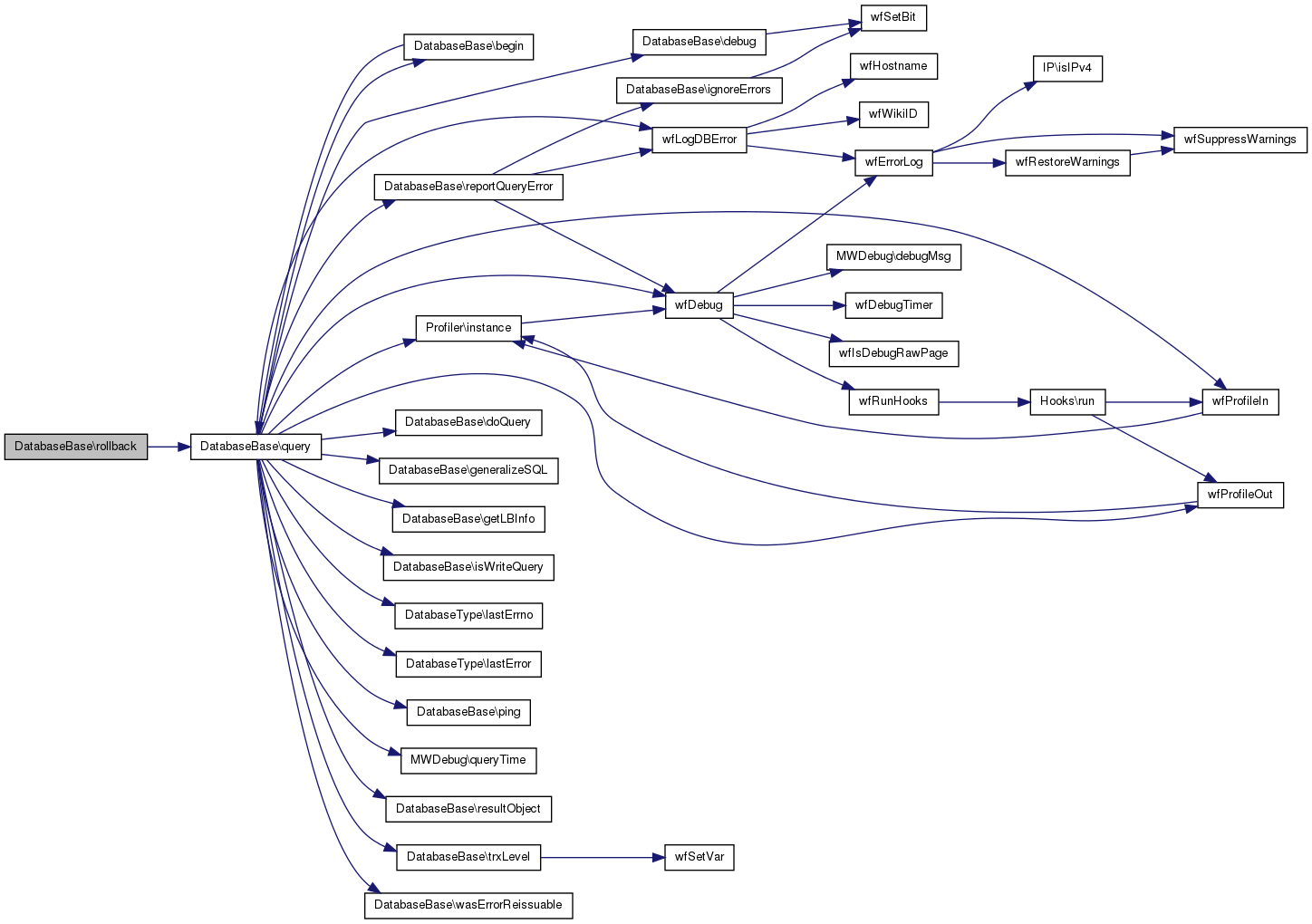

| DatabaseBase::safeQuery | ( | $ | query, |
| $ | args = null |
||
| ) |
Prepare & execute an SQL statement, quoting and inserting arguments in the appropriate places.
This function should not be used directly by new code outside of the database classes. The query wrapper functions (select() etc.) should be used instead.
- Parameters:
-
$query String $args ...
- Returns:
- ResultWrapper
Reimplemented in DatabaseIbm_db2.
Definition at line 987 of file Database.php.
References execute(), freePrepared(), and prepare().
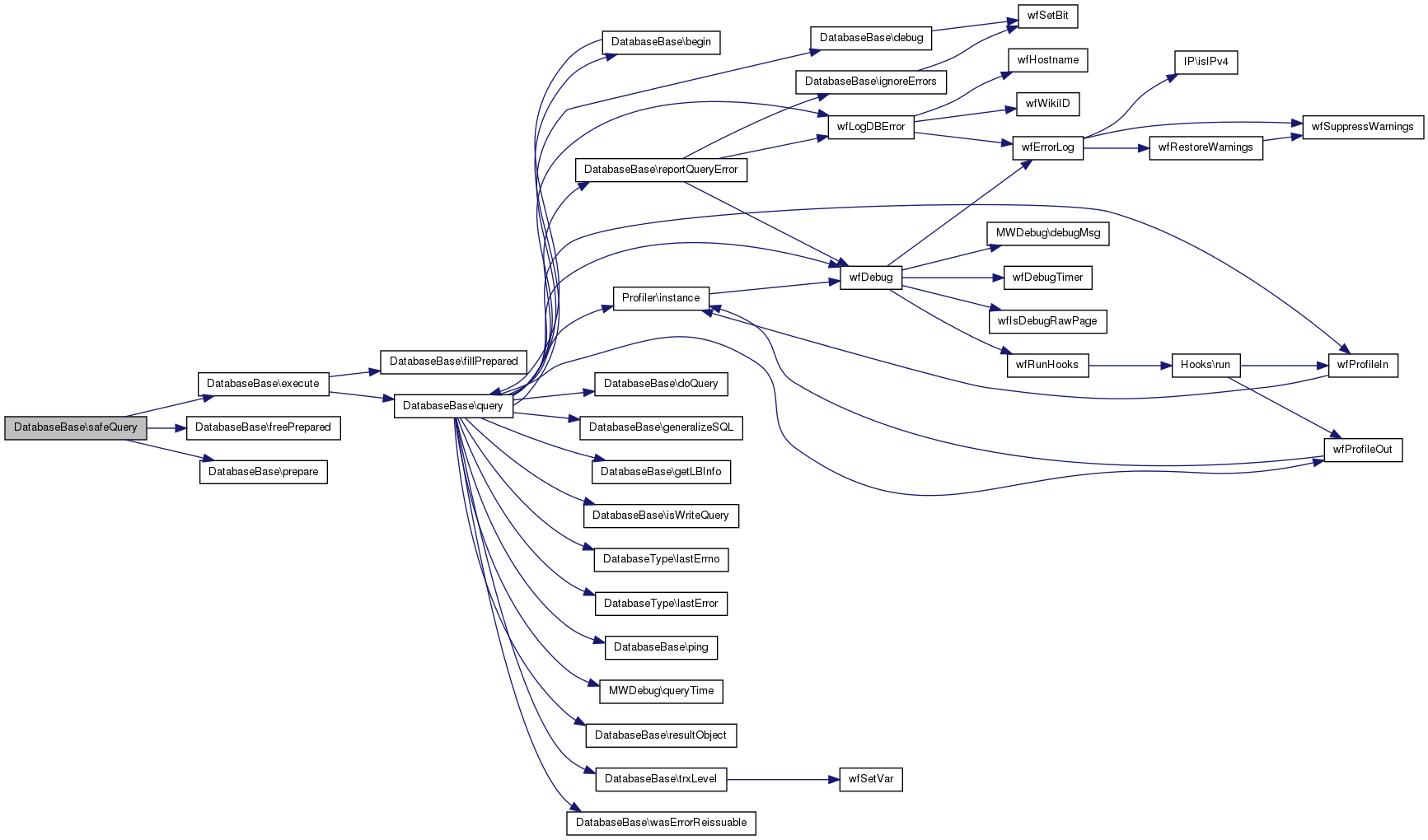
Returns true if this database can do a native search on IP columns e.g.
this works as expected: .. WHERE rc_ip = '127.42.12.102/32';
- Returns:
- bool
Reimplemented in DatabaseIbm_db2, DatabaseOracle, and DatabasePostgres.
Definition at line 465 of file Database.php.
| DatabaseBase::select | ( | $ | table, |
| $ | vars, | ||
| $ | conds = '', |
||
| $ | fname = 'DatabaseBase::select', |
||
| $ | options = array(), |
||
| $ | join_conds = array() |
||
| ) |
Execute a SELECT query constructed using the various parameters provided.
See below for full details of the parameters.
- Parameters:
-
$table String|Array Table name $vars String|Array Field names $conds String|Array Conditions $fname String Caller function name $options Array Query options $join_conds Array Join conditions $table string|array
May be either an array of table names, or a single string holding a table name. If an array is given, table aliases can be specified, for example:
array( 'a' => 'user' )
This includes the user table in the query, with the alias "a" available for use in field names (e.g. a.user_name).
All of the table names given here are automatically run through DatabaseBase::tableName(), which causes the table prefix (if any) to be added, and various other table name mappings to be performed.
- Parameters:
-
$vars string|array
May be either a field name or an array of field names. The field names here are complete fragments of SQL, for direct inclusion into the SELECT query. Expressions and aliases may be specified as in SQL, for example:
array( 'MAX(rev_id) AS maxrev' )
If an expression is given, care must be taken to ensure that it is DBMS-independent.
- Parameters:
-
$conds string|array
May be either a string containing a single condition, or an array of conditions. If an array is given, the conditions constructed from each element are combined with AND.
Array elements may take one of two forms:
- Elements with a numeric key are interpreted as raw SQL fragments.
- Elements with a string key are interpreted as equality conditions, where the key is the field name.
- If the value of such an array element is a scalar (such as a string), it will be treated as data and thus quoted appropriately. If it is null, an IS NULL clause will be added.
- If the value is an array, an IN(...) clause will be constructed, such that the field name may match any of the elements in the array. The elements of the array will be quoted.
Note that expressions are often DBMS-dependent in their syntax. DBMS-independent wrappers are provided for constructing several types of expression commonly used in condition queries. See:
- Parameters:
-
$options string|array
Optional: Array of query options. Boolean options are specified by including them in the array as a string value with a numeric key, for example:
array( 'FOR UPDATE' )
The supported options are:
- OFFSET: Skip this many rows at the start of the result set. OFFSET with LIMIT can theoretically be used for paging through a result set, but this is discouraged in MediaWiki for performance reasons.
- LIMIT: Integer: return at most this many rows. The rows are sorted and then the first rows are taken until the limit is reached. LIMIT is applied to a result set after OFFSET.
- FOR UPDATE: Boolean: lock the returned rows so that they can't be changed until the next COMMIT.
- DISTINCT: Boolean: return only unique result rows.
- GROUP BY: May be either an SQL fragment string naming a field or expression to group by, or an array of such SQL fragments.
- HAVING: A string containing a HAVING clause.
- ORDER BY: May be either an SQL fragment giving a field name or expression to order by, or an array of such SQL fragments.
- USE INDEX: This may be either a string giving the index name to use for the query, or an array. If it is an associative array, each key gives the table name (or alias), each value gives the index name to use for that table. All strings are SQL fragments and so should be validated by the caller.
- EXPLAIN: In MySQL, this causes an EXPLAIN SELECT query to be run, instead of SELECT.
And also the following boolean MySQL extensions, see the MySQL manual for documentation:
- LOCK IN SHARE MODE
- STRAIGHT_JOIN
- HIGH_PRIORITY
- SQL_BIG_RESULT
- SQL_BUFFER_RESULT
- SQL_SMALL_RESULT
- SQL_CALC_FOUND_ROWS
- SQL_CACHE
- SQL_NO_CACHE
- Parameters:
-
$join_conds string|array
Optional associative array of table-specific join conditions. In the most common case, this is unnecessary, since the join condition can be in $conds. However, it is useful for doing a LEFT JOIN.
The key of the array contains the table name or alias. The value is an array with two elements, numbered 0 and 1. The first gives the type of join, the second is an SQL fragment giving the join condition for that table. For example:
array( 'page' => array('LEFT JOIN','page_latest=rev_id') )
- Returns:
- ResultWrapper. If the query returned no rows, a ResultWrapper with no rows in it will be returned. If there was a query error, a DBQueryError exception will be thrown, except if the "ignore errors" option was set, in which case false will be returned.
Reimplemented in DatabaseIbm_db2, and DatabaseMssql.
Definition at line 1354 of file Database.php.
References $fname, $options, query(), and selectSQLText().
Referenced by DatabaseMysql\estimateRowCount(), DatabasePostgres\estimateRowCount(), estimateRowCount(), DatabaseSqlite\listTables(), selectField(), and selectRow().
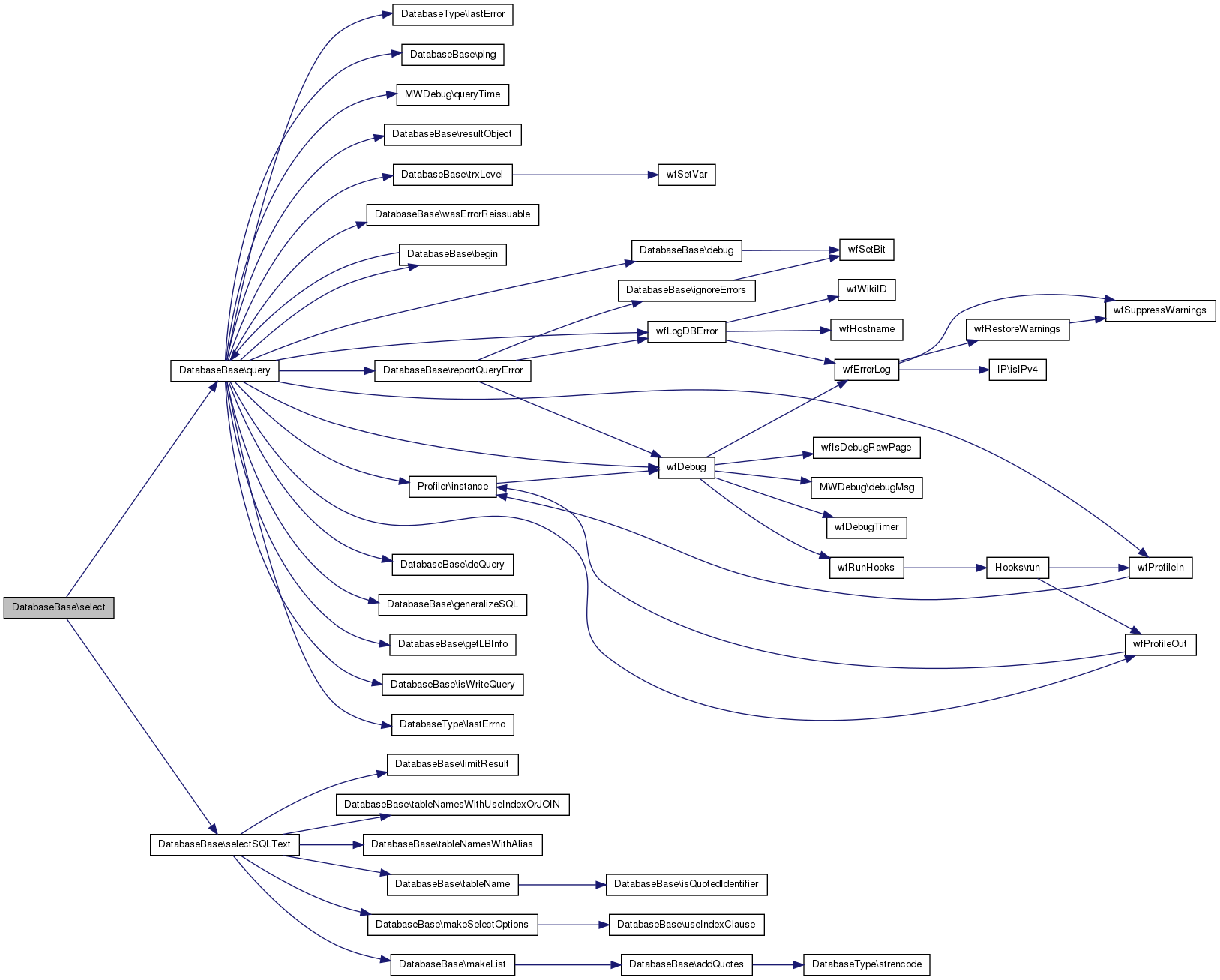

| DatabaseBase::selectDB | ( | $ | db | ) |
Change the current database.
- Todo:
- Explain what exactly will fail if this is not overridden.
- Parameters:
-
$db
- Returns:
- bool Success or failure
Reimplemented in DatabaseOracle, DatabaseMssql, DatabaseMysql, and DatabasePostgres.
Definition at line 1885 of file Database.php.
| DatabaseBase::selectField | ( | $ | table, |
| $ | var, | ||
| $ | cond = '', |
||
| $ | fname = 'DatabaseBase::selectField', |
||
| $ | options = array() |
||
| ) |
A SELECT wrapper which returns a single field from a single result row.
Usually throws a DBQueryError on failure. If errors are explicitly ignored, returns false on failure.
If no result rows are returned from the query, false is returned.
- Parameters:
-
$table string|array Table name. See DatabaseBase::select() for details. $var string The field name to select. This must be a valid SQL fragment: do not use unvalidated user input. $cond string|array The condition array. See DatabaseBase::select() for details. $fname string The function name of the caller. $options string|array The query options. See DatabaseBase::select() for details.
- Returns:
- false|mixed The value from the field, or false on failure.
Definition at line 1096 of file Database.php.
References $fname, $options, $res, DatabaseType\fetchRow(), DatabaseType\numRows(), and select().
Referenced by DatabasePostgres\roleExists(), DatabasePostgres\ruleExists(), DatabasePostgres\schemaExists(), and DatabaseMysql\setBigSelects().


| DatabaseBase::selectRow | ( | $ | table, |
| $ | vars, | ||
| $ | conds, | ||
| $ | fname = 'DatabaseBase::selectRow', |
||
| $ | options = array(), |
||
| $ | join_conds = array() |
||
| ) |
Single row SELECT wrapper.
Equivalent to DatabaseBase::select(), except that a single row object is returned. If the query returns no rows, false is returned.
- Parameters:
-
$table string|array Table name $vars string|array Field names $conds array Conditions $fname string Caller function name $options string|array Query options $join_conds array|string Join conditions
- Returns:
- ResultWrapper|bool
Reimplemented in DatabaseOracle.
Definition at line 1440 of file Database.php.
References $fname, $options, $res, DatabaseType\fetchObject(), DatabaseType\numRows(), and select().
Referenced by DatabaseSqlite\indexUnique().


| DatabaseBase::selectSQLText | ( | $ | table, |
| $ | vars, | ||
| $ | conds = '', |
||
| $ | fname = 'DatabaseBase::select', |
||
| $ | options = array(), |
||
| $ | join_conds = array() |
||
| ) |
The equivalent of DatabaseBase::select() except that the constructed SQL is returned, instead of being immediately executed.
- Parameters:
-
$table string|array Table name $vars string|array Field names $conds string|array Conditions $fname string Caller function name $options string|array Query options $join_conds string|array Join conditions
- Returns:
- SQL query string.
- See also:
- DatabaseBase::select()
Reimplemented in DatabaseMssql.
Definition at line 1375 of file Database.php.
References $options, limitResult(), makeList(), makeSelectOptions(), tableName(), tableNamesWithAlias(), and tableNamesWithUseIndexOrJOIN().
Referenced by DatabaseIbm_db2\select(), and select().


| DatabaseBase::set | ( | $ | table, |
| $ | var, | ||
| $ | value, | ||
| $ | cond, | ||
| $ | fname = 'DatabaseBase::set' |
||
| ) |
Simple UPDATE wrapper.
Usually throws a DBQueryError on failure. If errors are explicitly ignored, returns success
This function exists for historical reasons, DatabaseBase::update() has a more standard calling convention and feature set
- Parameters:
-
$table string $var $value $cond $fname string
- Returns:
- bool
Definition at line 1071 of file Database.php.
References $fname, query(), DatabaseType\strencode(), and tableName().

| DatabaseBase::setBigSelects | ( | $ | value = true | ) |
Allow or deny "big selects" for this session only.
This is done by setting the sql_big_selects session variable.
This is a MySQL-specific feature.
- Parameters:
-
$value Mixed: true for allow, false for deny, or "default" to restore the initial value
Reimplemented in DatabaseMysql.
Definition at line 3453 of file Database.php.
| DatabaseBase::setFakeMaster | ( | $ | enabled = true | ) |
Make this connection a fake master.
- Parameters:
-
$enabled bool
Reimplemented in DatabaseOracle, and DatabasePostgres.
Definition at line 389 of file Database.php.
| DatabaseBase::setFakeSlaveLag | ( | $ | lag | ) |
Set lag time in seconds for a fake slave.
- Parameters:
-
$lag int
Definition at line 380 of file Database.php.
| DatabaseBase::setFlag | ( | $ | flag | ) |
Set a flag for this connection.
- Parameters:
-
$flag Integer: DBO_* constants from Defines.php: - DBO_DEBUG: output some debug info (same as debug())
- DBO_NOBUFFER: don't buffer results (inverse of bufferResults())
- DBO_IGNORE: ignore errors (same as ignoreErrors())
- DBO_TRX: automatically start transactions
- DBO_DEFAULT: automatically sets DBO_TRX if not in command line mode and removes it in command line mode
- DBO_PERSISTENT: use persistant database connection
Definition at line 516 of file Database.php.
| DatabaseBase::setLBInfo | ( | $ | name, |
| $ | value = null |
||
| ) |
Set the LB info array, or a member of it.
If called with one parameter, the LB info array is set to that parameter. If it is called with two parameters, the member with the given name is set to the given value.
- Parameters:
-
$name $value
Definition at line 367 of file Database.php.
| DatabaseBase::setSchemaVars | ( | $ | vars | ) |
Set variables to be used in sourceFile/sourceStream, in preference to the ones in $GLOBALS.
If an array is set here, $GLOBALS will not be used at all. If it's set to false, $GLOBALS will be used.
- Parameters:
-
$vars False, or array mapping variable name to value.
Definition at line 3143 of file Database.php.
| DatabaseBase::setSessionOptions | ( | array $ | options | ) |
Override database's default behavior.
$options include: 'connTimeout' : Set the connection timeout value in seconds. May be useful for very long batch queries such as full-wiki dumps, where a single query reads out over hours or days.
- Parameters:
-
$options Array
- Returns:
- void
Reimplemented in DatabaseMysql.
Definition at line 3076 of file Database.php.
Referenced by setTimeout().

| DatabaseBase::setTimeout | ( | $ | timeout | ) |
Override database's default connection timeout.
- Parameters:
-
$timeout Integer in seconds
- Returns:
- void
- Deprecated:
- since 1.19; use setSessionOptions()
Definition at line 3061 of file Database.php.
References setSessionOptions(), and wfDeprecated().

| DatabaseBase::sourceFile | ( | $ | filename, |
| $ | lineCallback = false, |
||
| $ | resultCallback = false, |
||
| $ | fname = false |
||
| ) |
Read and execute SQL commands from a file.
Returns true on success, error string or exception on failure (depending on object's error ignore settings).
- Parameters:
-
$filename String: File name to open $lineCallback Callback: Optional function called before reading each line $resultCallback Callback: Optional function called for each MySQL result $fname String: Calling function name or false if name should be generated dynamically using $filename
- Returns:
- bool|string
Definition at line 3091 of file Database.php.
References $fname, sourceStream(), wfRestoreWarnings(), and wfSuppressWarnings().

| DatabaseBase::sourceStream | ( | $ | fp, |
| $ | lineCallback = false, |
||
| $ | resultCallback = false, |
||
| $ | fname = 'DatabaseBase::sourceStream', |
||
| $ | inputCallback = false |
||
| ) |
Read and execute commands from an open file handle.
Returns true on success, error string or exception on failure (depending on object's error ignore settings).
- Parameters:
-
$fp Resource: File handle $lineCallback Callback: Optional function called before reading each line $resultCallback Callback: Optional function called for each MySQL result $fname String: Calling function name $inputCallback Callback: Optional function called for each complete line (ended with ;) sent
- Returns:
- bool|string
Reimplemented in DatabaseOracle.
Definition at line 3160 of file Database.php.
References $fname, $res, DatabaseType\lastError(), query(), replaceVars(), and streamStatementEnd().
Referenced by sourceFile().


Returns true if this database requires that SELECT DISTINCT queries require that all ORDER BY expressions occur in the SELECT list per the SQL92 standard.
- Returns:
- bool
Reimplemented in DatabaseMysql.
Definition at line 455 of file Database.php.
| DatabaseBase::streamStatementEnd | ( | &$ | sql, |
| &$ | newLine | ||
| ) |
Called by sourceStream() to check if we've reached a statement end.
- Parameters:
-
$sql String SQL assembled so far $newLine String New line about to be added to $sql
- Returns:
- Bool Whether $newLine contains end of the statement
Reimplemented in DatabasePostgres, and DatabaseMysql.
Definition at line 3218 of file Database.php.
Referenced by sourceStream().

Returns true if this database is strict about what can be put into an IP field.
Specifically, it uses a NULL value instead of an empty string.
- Returns:
- bool
Reimplemented in DatabaseIbm_db2, DatabaseOracle, DatabasePostgres, and DatabaseMssql.
Definition at line 417 of file Database.php.
| DatabaseBase::strreplace | ( | $ | orig, |
| $ | old, | ||
| $ | new | ||
| ) |
Returns a comand for str_replace function in SQL query.
Uses REPLACE() in MySQL
- Parameters:
-
$orig String: column to modify $old String: column to seek $new String: column to replace with
- Returns:
- string
Definition at line 2674 of file Database.php.
| DatabaseBase::tableExists | ( | $ | table, |
| $ | fname = __METHOD__ |
||
| ) |
Query whether a given table exists.
- Parameters:
-
$table string $fname string
- Returns:
- bool
Reimplemented in DatabaseOracle, and DatabaseIbm_db2.
Definition at line 1564 of file Database.php.
References $fname, $res, ignoreErrors(), query(), and tableName().
Referenced by DatabaseMysql\dropTable(), and dropTable().
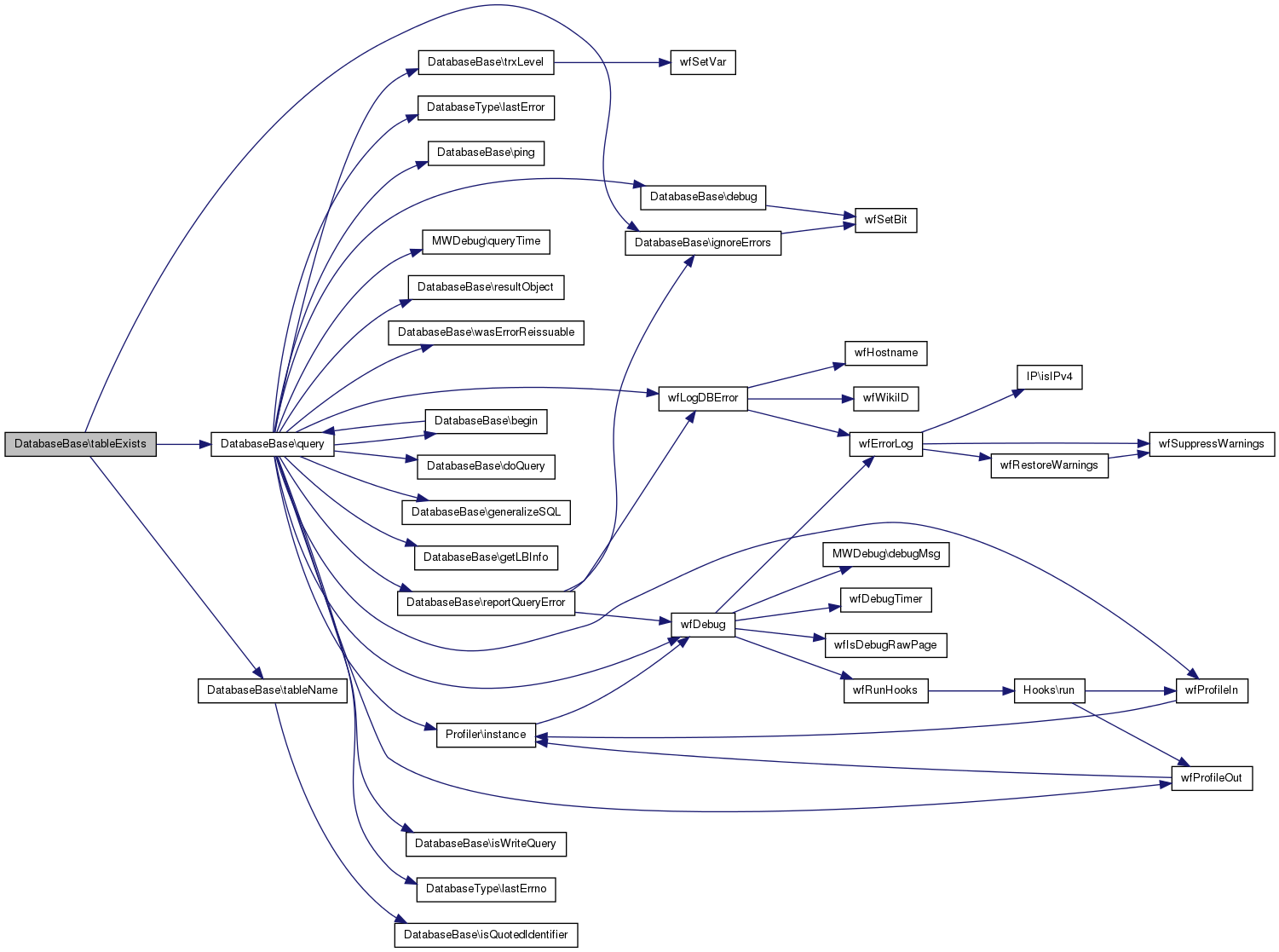

| DatabaseBase::tableName | ( | $ | name, |
| $ | format = 'quoted' |
||
| ) |
Format a table name ready for use in constructing an SQL query.
This does two important things: it quotes the table names to clean them up, and it adds a table prefix if only given a table name with no quotes.
All functions of this object which require a table name call this function themselves. Pass the canonical name to such functions. This is only needed when calling query() directly.
- Parameters:
-
$name String: database table name $format String One of: quoted - Automatically pass the table name through addIdentifierQuotes() so that it can be used in a query. raw - Do not add identifier quotes to the table name
- Returns:
- String: full database name
Reimplemented in DatabaseIbm_db2, DatabaseOracle, DatabasePostgres, and DatabaseSqlite.
Definition at line 1924 of file Database.php.
References $wgSharedDB, $wgSharedPrefix, $wgSharedTables, and isQuotedIdentifier().
Referenced by delete(), DatabaseMysql\deleteJoin(), deleteJoin(), DatabaseMysql\dropTable(), dropTable(), DatabaseMssql\fieldExists(), DatabaseMysql\fieldInfo(), DatabaseMssql\fieldInfo(), DatabaseMysql\indexInfo(), DatabaseMssql\insert(), insert(), insertSelect(), DatabaseMysql\lockTables(), nativeReplace(), replace(), selectSQLText(), set(), tableExists(), tableNameCallback(), DatabaseMssql\tableNamesWithUseIndexOrJOIN(), DatabaseMssql\textFieldSize(), textFieldSize(), and update().


| DatabaseBase::tableNameCallback | ( | $ | matches | ) | [protected] |
Table name callback.
- Parameters:
-
$matches array
- Returns:
- string
Definition at line 3313 of file Database.php.
References $matches, and tableName().

Fetch a number of table names into an array This is handy when you need to construct SQL for joins.
Example: extract($dbr->tableNames('user','watchlist')); $sql = "SELECT wl_namespace,wl_title FROM $watchlist,$user WHERE wl_user=user_id AND wl_user=$nameWithQuotes";
- Returns:
- array
Definition at line 2003 of file Database.php.
Fetch a number of table names into an zero-indexed numerical array This is handy when you need to construct SQL for joins.
Example: list( $user, $watchlist ) = $dbr->tableNamesN('user','watchlist'); $sql = "SELECT wl_namespace,wl_title FROM $watchlist,$user WHERE wl_user=user_id AND wl_user=$nameWithQuotes";
- Returns:
- array
Definition at line 2025 of file Database.php.
| DatabaseBase::tableNamesWithAlias | ( | $ | tables | ) |
Gets an array of aliased table names.
- Parameters:
-
$tables array( [alias] => table )
- Returns:
- array of strings, see tableNameWithAlias()
Definition at line 2058 of file Database.php.
Referenced by selectSQLText().

| DatabaseBase::tableNamesWithUseIndexOrJOIN | ( | $ | tables, |
| $ | use_index = array(), |
||
| $ | join_conds = array() |
||
| ) | [protected] |
Get the aliased table name clause for a FROM clause which might have a JOIN and/or USE INDEX clause.
- Parameters:
-
$tables array ( [alias] => table ) $use_index array Same as for select() $join_conds array Same as for select()
- Returns:
- string
Reimplemented in DatabaseMssql.
Definition at line 2078 of file Database.php.
Referenced by selectSQLText().

| DatabaseBase::tableNameWithAlias | ( | $ | name, |
| $ | alias = false |
||
| ) |
Get an aliased table name e.g.
tableName AS newTableName
- Parameters:
-
$name string Table name, see tableName() $alias string|bool Alias (optional)
- Returns:
- string SQL name for aliased table. Will not alias a table to its own name
Definition at line 2044 of file Database.php.
| DatabaseBase::tablePrefix | ( | $ | prefix = null | ) |
Get/set the table prefix.
- Parameters:
-
$prefix The table prefix to set, or omitted to leave it unchanged.
- Returns:
- The previous table prefix.
Definition at line 334 of file Database.php.
References wfSetVar().
Referenced by DatabaseSqliteStandalone\__construct().


| DatabaseBase::textFieldSize | ( | $ | table, |
| $ | field | ||
| ) |
Returns the size of a text field, or -1 for "unlimited".
- Parameters:
-
$table string $field string
- Returns:
- int
Reimplemented in DatabaseIbm_db2, DatabaseOracle, DatabasePostgres, DatabaseSqlite, and DatabaseMssql.
Definition at line 2469 of file Database.php.
References $res, $size, DatabaseType\fetchObject(), query(), and tableName().
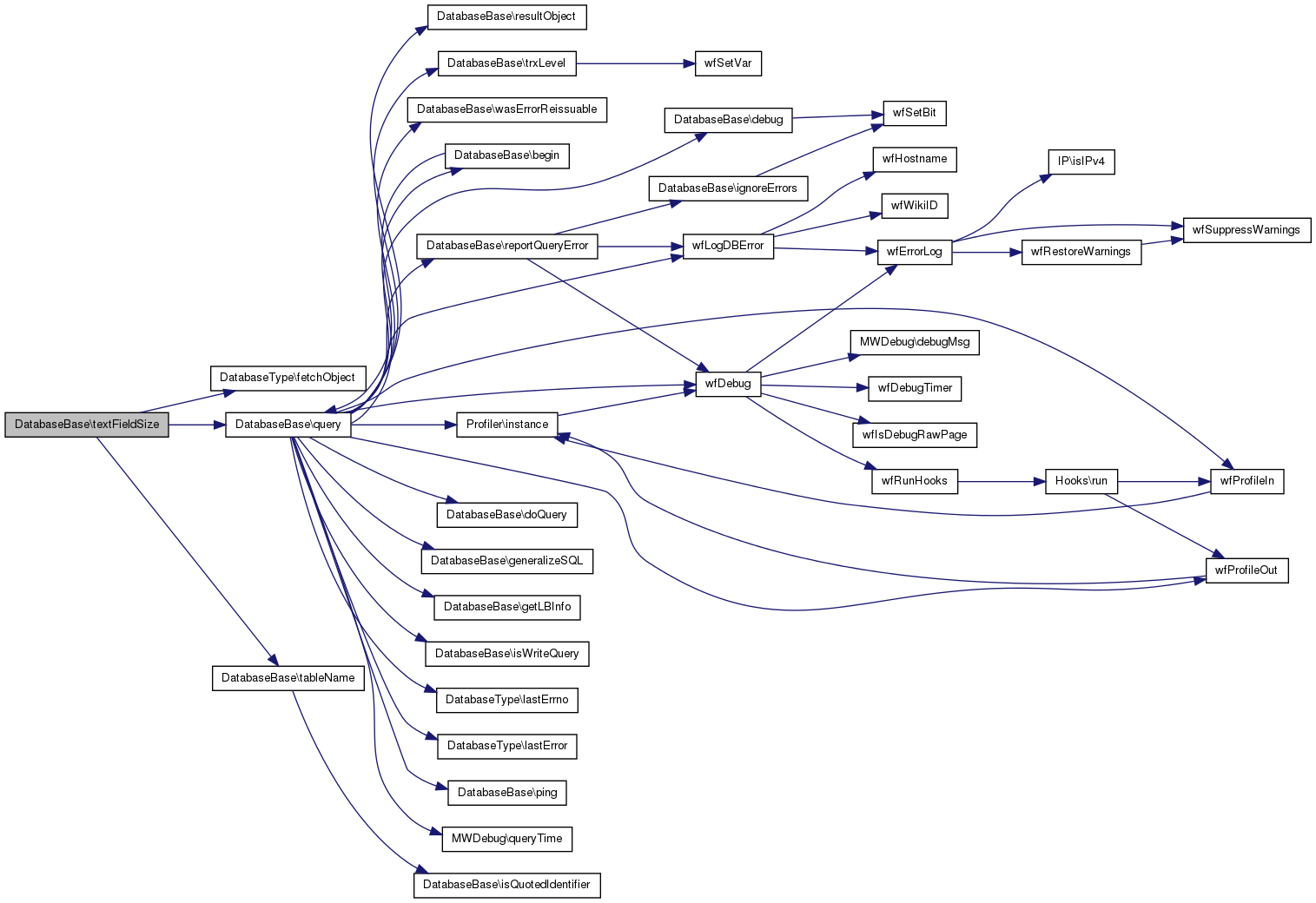
| DatabaseBase::timestamp | ( | $ | ts = 0 | ) |
Convert a timestamp in one of the formats accepted by wfTimestamp() to the format used for inserting into timestamp fields in this DBMS.
The result is unquoted, and needs to be passed through addQuotes() before it can be included in raw SQL.
- Parameters:
-
$ts string|int
- Returns:
- string
Reimplemented in DatabaseIbm_db2, DatabaseOracle, DatabasePostgres, and DatabaseMssql.
Definition at line 2934 of file Database.php.
References wfTimestamp().
Referenced by encodeExpiry(), and timestampOrNull().


| DatabaseBase::timestampOrNull | ( | $ | ts = null | ) |
Convert a timestamp in one of the formats accepted by wfTimestamp() to the format used for inserting into timestamp fields in this DBMS.
If NULL is input, it is passed through, allowing NULL values to be inserted into timestamp fields.
The result is unquoted, and needs to be passed through addQuotes() before it can be included in raw SQL.
- Parameters:
-
$ts string|int
- Returns:
- string
Definition at line 2951 of file Database.php.
References timestamp().

| DatabaseBase::trxLevel | ( | $ | level = null | ) |
Gets or sets the current transaction level.
Historically, transactions were allowed to be "nested". This is no longer supported, so this function really only returns a boolean.
- Parameters:
-
$level An integer (0 or 1), or omitted to leave it unchanged.
- Returns:
- The previous value
Definition at line 316 of file Database.php.
References wfSetVar().
Referenced by DatabaseSqlite\close(), DatabaseMysql\close(), DatabaseIbm_db2\close(), and query().


| DatabaseBase::unionQueries | ( | $ | sqls, |
| $ | all | ||
| ) |
Construct a UNION query This is used for providing overload point for other DB abstractions not compatible with the MySQL syntax.
- Parameters:
-
$sqls Array: SQL statements to combine $all Boolean: use UNION ALL
- Returns:
- String: SQL fragment
Reimplemented in DatabaseOracle, and DatabaseSqlite.
Definition at line 2646 of file Database.php.
Returns true if current database backend supports ORDER BY or LIMIT for separate subqueries within the UNION construct.
- Returns:
- Boolean
Reimplemented in DatabaseSqlite, and DatabaseMssql.
Definition at line 2634 of file Database.php.
| DatabaseBase::unlock | ( | $ | lockName, |
| $ | method | ||
| ) |
Release a lock.
- Parameters:
-
$lockName String: Name of lock to release $method String: Name of method calling us
- Returns:
- Returns 1 if the lock was released, 0 if the lock was not established by this thread (in which case the lock is not released), and NULL if the named lock did not exist
Reimplemented in DatabaseMysql.
Definition at line 3362 of file Database.php.
| DatabaseBase::unlockTables | ( | $ | method | ) |
Unlock specific tables.
- Parameters:
-
$method String the caller
- Returns:
- bool
Reimplemented in DatabaseMysql.
Definition at line 3387 of file Database.php.
| DatabaseBase::update | ( | $ | table, |
| $ | values, | ||
| $ | conds, | ||
| $ | fname = 'DatabaseBase::update', |
||
| $ | options = array() |
||
| ) |
UPDATE wrapper.
Takes a condition array and a SET array.
- Parameters:
-
$table String name of the table to UPDATE. This will be passed through DatabaseBase::tableName(). $values Array: An array of values to SET. For each array element, the key gives the field name, and the value gives the data to set that field to. The data will be quoted by DatabaseBase::addQuotes(). $conds Array: An array of conditions (WHERE). See DatabaseBase::select() for the details of the format of condition arrays. Use '*' to update all rows. $fname String: The function name of the caller (from __METHOD__), for logging and profiling. $options Array: An array of UPDATE options, can be: - IGNORE: Ignore unique key conflicts
- LOW_PRIORITY: MySQL-specific, see MySQL manual.
- Returns:
- Boolean
Reimplemented in DatabaseOracle, and DatabaseIbm_db2.
Definition at line 1737 of file Database.php.
References $fname, $options, makeList(), makeUpdateOptions(), query(), and tableName().

| DatabaseBase::useIndexClause | ( | $ | index | ) |
USE INDEX clause.
Unlikely to be useful for anything but MySQL. This is only needed because a) MySQL must be as efficient as possible due to its use on Wikipedia, and b) MySQL 4.0 is kind of dumb sometimes about which index to pick. Anyway, other databases might have different indexes on a given table. So don't bother overriding this unless you're MySQL.
- Parameters:
-
$index
- Returns:
- string
Reimplemented in DatabaseMysql.
Definition at line 2315 of file Database.php.
Referenced by makeSelectOptions(), and DatabaseMssql\tableNamesWithUseIndexOrJOIN().

Determines if the last failure was due to a deadlock STUB.
- Returns:
- bool
Reimplemented in DatabaseIbm_db2, DatabaseMysql, DatabaseOracle, DatabasePostgres, and DatabaseSqlite.
Definition at line 2694 of file Database.php.
Referenced by deadlockLoop().

Determines if the last query error was something that should be dealt with by pinging the connection and reissuing the query.
STUB
- Returns:
- bool
Reimplemented in DatabaseMysql, and DatabaseSqlite.
Definition at line 2715 of file Database.php.
Referenced by query().

Determines if the last failure was due to a lock timeout STUB.
- Returns:
- bool
Reimplemented in DatabaseMysql.
Definition at line 2704 of file Database.php.
Determines if the last failure was due to the database being read-only.
STUB
- Returns:
- bool
Reimplemented in DatabaseMysql, and DatabaseSqlite.
Definition at line 2725 of file Database.php.
Member Data Documentation
DatabaseBase::$delimiter = ';' [protected] |
Definition at line 231 of file Database.php.
DatabaseBase::$htmlErrors [protected] |
Definition at line 229 of file Database.php.
DatabaseBase::$mConn = null [protected] |
Reimplemented in DatabaseSqlite.
Definition at line 215 of file Database.php.
| DatabaseBase::$mDBname |
Definition at line 210 of file Database.php.
DatabaseBase::$mDefaultBigSelects = null [protected] |
Definition at line 224 of file Database.php.
DatabaseBase::$mDoneWrites = false [protected] |
Definition at line 207 of file Database.php.
DatabaseBase::$mErrorCount = 0 [protected] |
Definition at line 221 of file Database.php.
| DatabaseBase::$mFakeMaster = false |
Definition at line 223 of file Database.php.
DatabaseBase::$mFakeSlaveLag = null [protected] |
Definition at line 223 of file Database.php.
DatabaseBase::$mFlags [protected] |
Definition at line 219 of file Database.php.
DatabaseBase::$mLastQuery = '' [protected] |
Definition at line 206 of file Database.php.
DatabaseBase::$mLBInfo = array() [protected] |
Definition at line 222 of file Database.php.
DatabaseBase::$mOpened = false [protected] |
Definition at line 216 of file Database.php.
| DatabaseBase::$mPassword |
Definition at line 210 of file Database.php.
DatabaseBase::$mPHPError = false [protected] |
Definition at line 208 of file Database.php.
DatabaseBase::$mSchemaVars = false [protected] |
Definition at line 225 of file Database.php.
DatabaseBase::$mServer [protected] |
Definition at line 210 of file Database.php.
DatabaseBase::$mTablePrefix [protected] |
Definition at line 218 of file Database.php.
DatabaseBase::$mTrxLevel = 0 [protected] |
Definition at line 220 of file Database.php.
| DatabaseBase::$mUser |
Definition at line 210 of file Database.php.
DatabaseBase::$preparedArgs [protected] |
Definition at line 227 of file Database.php.
The documentation for this class was generated from the following file:
- includes/db/Database.php
